#rather than his xv appearance
Text
i keep hopping back and forth on whether i think my first take on prompto is more accurate than my last…. why is this such a struggle
#i don’t hate making character likeness sims bc 9/10 i just create them in my style or whatever so#but i still want there to be an Obvious resemblance beyond just the hair#the skyrim characters were easy because depending on what mods you had your npcs could look wildly different#so it was just aiming in a certain ballpark and hoping for the best#a lot of them i think turned out really good and fairly close to the source#but prompto has always been a hard character not just for me to bail but i kind of feel In General to get right#the thing about him is like. he’s kinda ugly like he’s kinda goofy looking#and people either swing too far into goofy or try to over correct by making him some beautiful perfect sexy man#part of me feels like my first take was good but it was more accurate to his vs13 appearance#rather than his xv appearance#but there’s still something about the new one that just feels Off#maybe he’s not silly goofy enough#i’m completely satisfied with noct tho#like i can accept he’s not perfect but he is genuinely i think as close as i can possibly get while maintaining a maxis style#anyway if small things about prompto keep changing just don’t perceive it thanks#lian blabs#dl
2 notes
·
View notes
Text
A. Z. Fell & Co. bookshop and its statues
To start off, you have to be warned that the former set was almost completely destroyed in the S1 bookshop fire and whatever wasn’t important enough to be salvaged before the shooting had to be replaced afterwards. Which means that a few memorable and already identified pieces aren’t there anymore, for better or worse.
This is going to be another long analysis, and certainly not a full one — I’ll describe only the big picture and the most important props. A continuation focusing on the decorations in the less prominent parts of the bookshop will follow here.
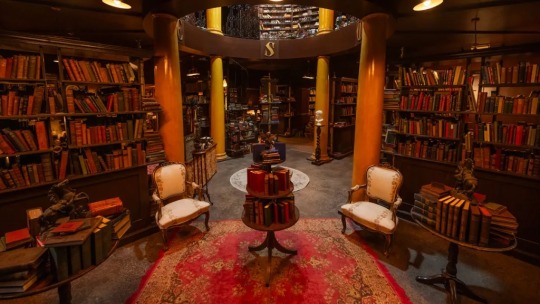
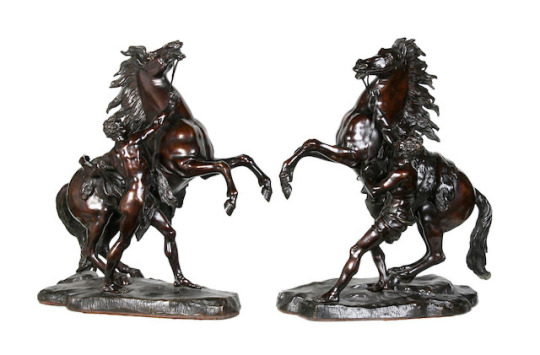
Right at the entrance we can see twin tables with the Marly Horses by Guillaume Coustou the Elder. The sculptures showing two rearing horses with their groom were originally commissioned by Louis XV of France for the entrance to château de Marly, a royal residence near Versailles.
In S2 Crowley is shown consistently using one of the horses, partially out of convenience, partially in line with a returning throughout the season dark horse theme. Ironically, the symbolic harnessing of a wild animal mirrors the supposed domestication of the demon by his angel, as seen in the transformation of the statue to the right from the entrance into an altar of his submission.
After all, there’s nothing more vulnerable to Crowley than losing the usual protection of his shades, and using a horse sculpture as a stand for his sunglasses speaks volumes about his natural aptitude towards uncertain and liminal states. He thrives in stress situations, dangles his feet while hopping onto a curb, and assumes the form of a non-Euclidean fluid when asked to sit down in a chair. Stability isn’t exactly what he’s most comfortable with. So what for Aziraphale signifies the power over his (theirs?) own domain and ultimate safe space, for Crowley means a challenge.
It makes sense that this particular spot near the exit is where the demon feels most secure in the bookshop, his favorite place in the world. That’s where he stood after crossing its threshold in 1941 too.
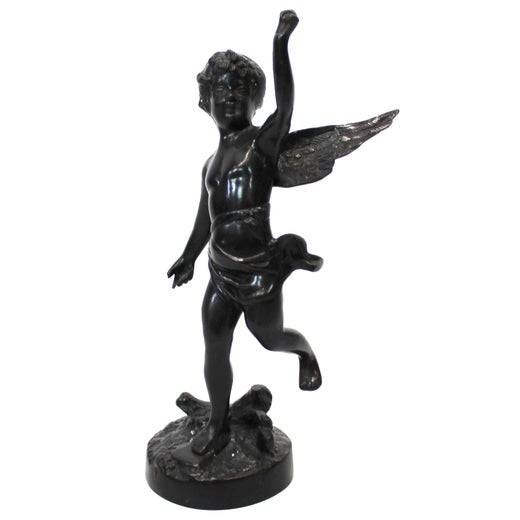
The statue in the middle, right on top of the central bookstand, was replaced after the S1 fire. It’s still clearly a Cupid, but in a different pose and without his weapons — instead of shooting an arrow, now he’s holding his left hand over his head, pointing up towards Heaven or God. Quite a change. This is the most similar copy made after Ernest Rancoulet. The butterfly-like wings (similar to the ones Rancoulet used in his La Nuit Tout Repose, At Night Everything Rests) on the copy in the bookshop have visible screws, so they were probably added either by the previous owner or the Good Omens art department.
What’s especially important from the analytic point of view is that similarly to S1, the Cupid in question still appears in the frame facing Crowley, but not targeting him anymore, like it used to, but rather mirroring. The most memorable example appears during the Final Fifteen™ when the demon points up with left hand to highlight his “No nightingales” line.
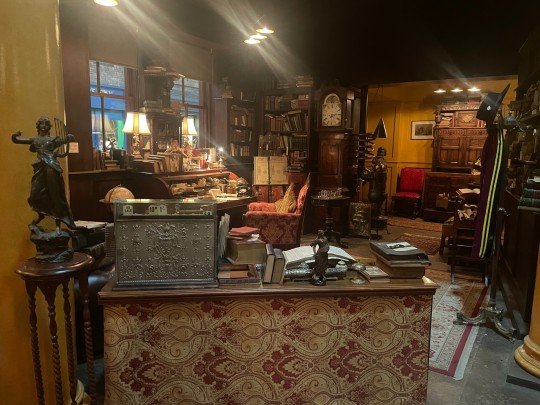
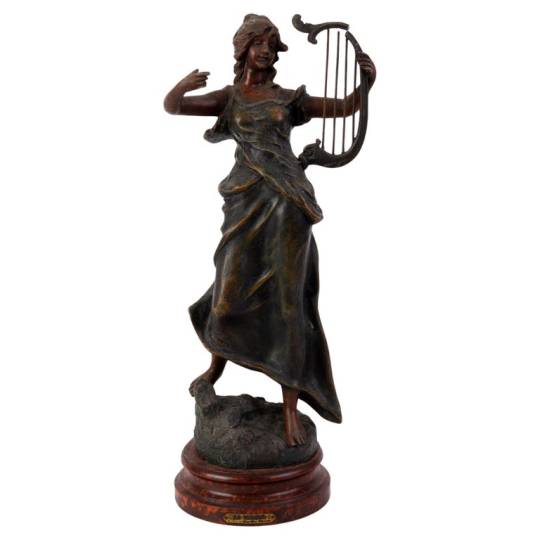
This one will be fun! Everyone, meet George Maxim’s bronze allegory of Music in her full glory. Angels like music in general, right? And Aziraphale is a known audiophile, which was asserted in the very first episode of the new season. But there’s another link to music in his angelic roots. A rather apocalyptic one — the Archangel Raphael is believed to blow the trumpet from a holy rock in Jerusalem to announce the Second Coming (the Day of Resurrection), and Israfil, its Islamic counterpart, Qiyamah (the Day of Judgment).
Staying in the very same context, let’s read the ballad Israfel by Edgar Allen Poe, which was obviously inspired by the titular Archangel.
Nothing on Earth lasts forever — but that’s exactly the reason why we should use it for inspiration, savor this momentary bliss, and hold it in our hearts. The ballad shares the same sentiment about all creation being temporary and only the passions of angels (i.e., Aziraphale’s and Crowley’s feelings) staying eternally unchanging as Aziraphale’s “Nothing lasts forever”. His line was intended as an affirmation of his feelings, similar to “You go too fast for me, Crowley”.
And just like the Cupid is mirroring Crowley in the “No nightingales” line, Music is targeting Aziraphale with her harp in the following frame.
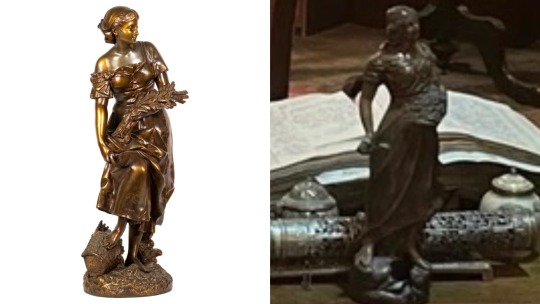
On the counter there’s a smaller bronze statue, which original unfortunately remains unidentified, but I was able to track some similar designs. A woman coming back from the harvest with crops — either a representation of Autumn or the Greek goddess Demeter bringing a blessing of a plentiful harvest. In the Bible, the harvest is a metaphor for both spiritual fruitfulness and judgment. Our productivity in God’s kingdom is supposedly tied to our faith and obedience. And the most popular verses repeat an even older saying, how one reaps what they sow:
Do not be deceived: God is not mocked, for whatever one sows, that will he also reap. For the one who sows to his own flesh will from the flesh reap corruption, but the one who sows to the Spirit will from the Spirit reap eternal life. (Galatians 6:7-8)
And another angel came out of the temple, calling with a loud voice to him who sat on the cloud, “Put in your sickle, and reap, for the hour to reap has come, for the harvest of the earth is fully ripe.” (Revelation 14:15)
The harvest is past, the summer is ended, and we are not saved. (Jeremiah 8:20)
If you read The summer that was never supposed to end meta, you’ll interpret the figure itself as a rather ominous sign. Now let’s add to it positioning right next to the gigantic Victorian cash register one cannot possibly overlook and the recurring theme of payment. And the fact that it conveniently disappears at some point in The Ball (S02E05) episode, never to be seen again. Is the payment reminder not needed anymore, because its day just came?
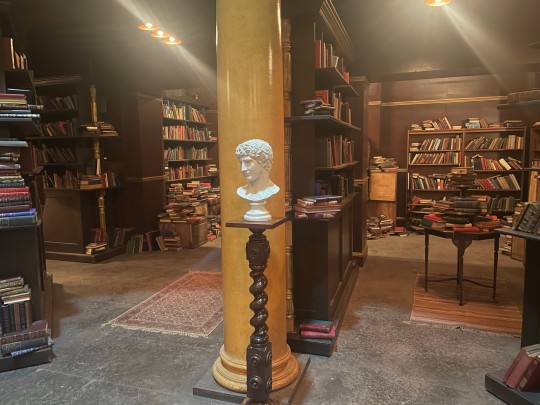
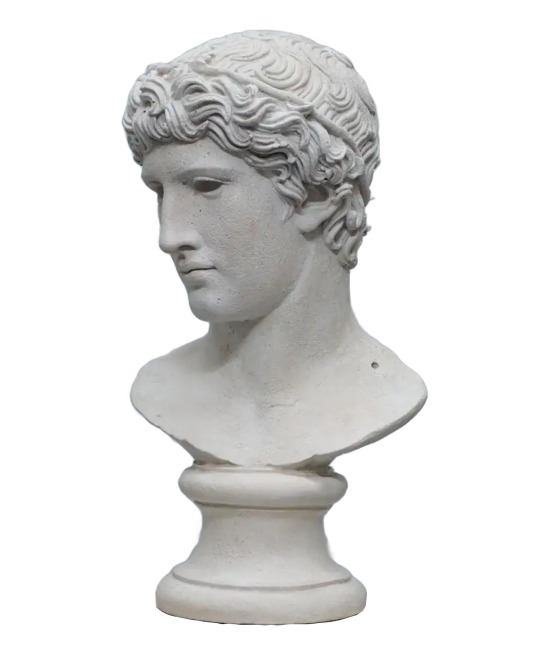
For some reason ever since S1 this one was often interpreted as a bust of Alexander the Great by the fandom. The proper name is the Head of a Victorious Athlete, also known as Benevento Head. As this suggests, the originally bronze sculpture represents a victorious athlete wearing an olive crown and was found near Benevento in Italy, in the remnants of the ancient town Herculaneum, wiped off from the face of the earth together with Pompeii in a tragic volcanic eruption (which was conveniently used later on as a more modern example of the story of Sodom and Gomorrah). It’s an obviously Roman copy of a Greek sculpture and dates back to 50 AD, less than a decade after Aziraphale and Crowley met in Rome in 41 AD— who knows, maybe they were still around at the time? This would make an interesting connection to the statue Crowley brought back to his apartment in 1941.
And no, in the HD quality and especially en face it doesn’t appear similar to Crowley. In fact, there seems to be a very good reason why most photographers choose another, more flattering angle for this particular artwork. But aesthetics aside, the white bust seems more like a mirror for Aziraphale and his self-constructed (and self-imposed) idealized image, based on a specific set of virtues. The presented athlete is victorious because he’s the epitome of the Platonic Triad of higher Forms: Truth, Beauty, and Excellence, understood in the wider context of the Greek Aretē.
To highlight this point, in S1 the head was literally used as a designated display place of the medal Aziraphale got as a commendation for his 6000 years on Earth in the 1800 cut scene. As a free agent not affiliated with Heaven in S2 he doesn’t hang it there anymore, but the medal is still in the bookshop, visible on his desk. You can see it in detail and read the description of its provenance in the last bookshop meta.
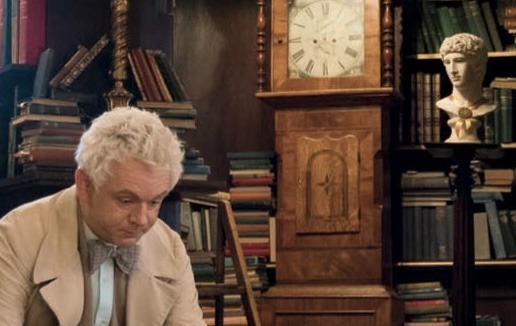
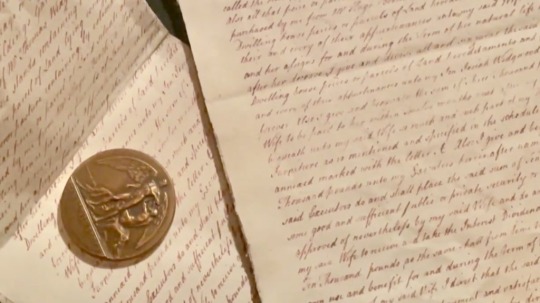
Daedalus and Icarus are a very popular motif in the history of art, but certainly not in this overtly masculine, military style. Icarus was too ambitious for his own good and ignored explicit instructions, which constitutes both the sin of pride and that of disobedience to one's parents (or one’s Creator?).
Interestingly, there’s also a version of the myth in which Icarus fashioned himself greater than Helios, the Sun himself, and the god himself punished him for it with the fall — which resonates very strongly with my vision of Crowley both in relation to his Fall and potential S3 development.
But back to Aziraphale. If the medal in question was given to him as a commendation he from the Supreme Archangel himself, it also serves as a warning for him to not get too arrogant or comfortable with his accomplishment (i.e., life on Earth) or it might lead to his fall (or, in this case, Fall).
Foreshadowing much?
#Yuri is doing her thing#good omens#good omens meta#A. Z. Fell & Co.#Aziraphale#Aziraphale’s bookshop#those art history classes weren’t a waste of time after all
365 notes
·
View notes
Text
Pay it no mind
Part XVI (kinda? Idk. Explanation in the note.)
In which reader confesses their feelings to Gojo, but it seems these are not returned (maybe?).
Warnings: reader is on the receiving end of rejection (kinda), and the fact that I'm obsessed with unrequited love is a warning itself. I would say reader is ooc in this one, or it might feel like that. I don't know. There are also mentions of a difficult family situation (awful father, deceased mother, etc.)... Oh, and this almost makes me look anti-Gojo (I'm not, though).
Previous: Part I, Part II, Part III, Part IV, Part V, Part VI, Part VII, Part VIII, Part IX, Part X, Part XI, Part XII, Part XIII, Part IV, Part XV
----------------------
“Aomori?” you repeated in disbelief. Isn’t that like…?”
Haruki leaned forward on his elbows on the table and placed his head in his hands in frustration. You watched his fingers bury themselves in his brown curls and tug them.
“It’s about a ten-hour bus ride or four hours in the train...” he said without looking at you. His eyes were on the table, and you could only see the top of his head. “That if I’m lucky… Which I am not, obviously,” he grumbled and lifted his head to look at you.
You two were at the coffee shop where he worked, or rather, used to work. He had submitted his resignation the day before.
“That’s far.” You were not sure of what else to say. The notice of his departure was coming in too sudden. Only a few days ago you had been talking about maybe meeting up on New Year’s Eve, and now he was leaving? “For… For how long?”
Ikeda looked outside and shrugged. “He’s transferring me there so I guess he means at least until the end of high school, and then…” he frowned. In fact, he was not sure of what would happen after that. “I’m sure that jerk will come up with something else.”
Haruki looked back at you and, realizing what he had said, quickly apologized for speaking like that in front of you.
“I’m sorry. I just can’t believe he did this behind my back. I knew he could not stand seeing me, but I never thought he would plan something like this and ambush me any other Tuesday.”
He sighed, and you looked at him with sympathy. It was the most distressed you had ever seen him, and the most upset too.
Haruki, who always looked happy and unbothered when he was with you, had only ever appeared uncomfortable, and sometimes even angered, when he spoke about his father. At first, you had believed they just did not get along, but it was more than that; Haruki had told you once that his father seemed to resent him since his mother left.
“I’ve never blamed her,” he told you one day while you waited for his train, “she was sick and he was never at home, but when he was, he was horrible to her.”
He had then showed you her picture. A beautiful woman with long brown hair and bright eyes a few shades clearer than her locks, smiling and hugging an eight-year-old Haruki; he had definitely gotten the looks from her, and it was evident she had loved him dearly.
Due to her illness, Haruki’s mother had passed away just a couple years after leaving her husband, before she was able to fulfill her promise to his son to come back for him. Hence, Haruki had ended up stuck with a resentful father who was almost never at home, but when he was, he was as horrible to his son as he had been to the mother he resembled. And now, he was sending him to live with his uncle in a distant prefecture to attend a new school.
He had given Haruki little less than a week to, and the boy quoted, “wrap up any business in Tokyo.”
Apparently, that included you, who did your best to comfort him, even if there was not much you could say or do.
“I will miss you,” Ikeda said after you assured him it would be alright and that two or three years would sure fly by, and then he would not need to listen to what his father or his uncle said. It seemed his mood had improved a little at that.
“I will miss you too,” you told him, still wrapping your head around the idea of not seeing him anymore.
If only you could see curses, maybe there would be another way out for you, maybe we could have more time.
You pushed that thought away. That was selfish thinking, was it not? Of course, you would not want Haruki to live in gore and pain as a sorcerer. There had to be better, more peaceful options for him somewhere.
“I like you a lot.” His words pulled you out of your head, and when your eyes focused on him, you noticed his face was flushed, but he was looking right at you. “I think I could have loved you. Not that I don’t now,” he smiled softly, “but in the way I wanted to love you.”
There was a tinge of sadness in his voice, but your heart was beating faster as he spoke. Did that mean you wanted to love him too?
“I…” you started, but he shook his head and smiled.
“It’s fine. I thought we had more time, so I did not tell you sooner, but now, I just realized I wanted to let you know in person.”
Haruki had not planned to confess that day. He was only going to tell you he was leaving and ask you to stay in touch but realizing that it might be the last time he was going to see you in, perhaps, a long time, he felt he needed to tell you. He had wanted to tell you since the first time you had accepted going out with him that summer, but he then thought it was better not to rush and just let your friendship take its course.
At the end of the day, people should honor their feelings.
That he believed whole-heartedly. That is why Gojo’s attitude had annoyed him, acting as a jealous boyfriend around you if he was nearby but still claiming to be just your friend. If he wanted more, he should admit it instead of doing whatever he thought he was doing that day he accompanied him to the station.
“Haruki, I like you too,” you said sincerely.
But do you like me as I like you? the boy wondered.
He would not ask you that as he would not ask for more at this point. What could he ask, that you waited for him? He was not that arrogant to believe you had to do it nor that idealistic to make promises he knew time could swallow. Knowing that you had cared about him was enough.
He gave you a closed-eye smile. “I’m so glad.”
***
But saying it had not changed anything. You and Haruki had agreed to staying in touch and he had hugged you tightly before letting you go.
Maybe he knew we would drift apart.
You had kept texting and calling each other after that. Once he was with his uncle, he had given you his address, so you could exchange letters; he even sent you a few postcards with some pretty views around his new city. For a little while, you thought you could remain friends and just live on it, but his absence became increasingly painful, and when you both got busy with school again, and he was barely replying to your messages and his letters felt distant, the realization that maybe you had truly loved and lost was devastating.
It happened slowly but not painlessly. There was just never a good time for a quick call anymore, the messages were fewer and shorter, and you probably did not reply to the last one because there was nothing to say, and finally, the letters. Oh, the letters... Once funny and vibrant as your friend had been, they became nothing but curt and disappointing. It was hard to believe that two people who once had so much to talk about could barely bring themselves to write more than a few lines for each other.
I guess people can enter your life seamlessly, but they can hardly leave like that.
Your friends comforted you to their best, and Satoru made it his mission to ensure you would not feel lonely doing the things you liked anymore. Despite your protests, he attached himself to your hip as he had done it when you were kids, even on the days when you did not want to leave your room.
And when, months after Haruki’s departure, you sat down in front of the training fields, tired of waiting for a letter that would not come, Satoru held your hand firmly as you accepted your loss and stayed by your side unfaltering, the same way you would do for him when Suguru left you all later down the road.
That was how, as the seasons changed, you quietly let go of your friend who had been a child of the spring himself.
----------------------
Note: I almost did not want to include this part? I mean, I felt like the other guy needed some explaining, and as much as I enjoyed it, I would say this is almost a filler, so I'm sorry of it's bad. Anyways, if the next part is not the last one, it will sure bring us quite closer. I've not forgotten where I left Satoru, promise!
Thank you for reading!
Next: Part XVII
@mavs-stuff @witchbybirth @crookedlyaddictedone-blog @tqd4455 @maybe-a-bi-witch @mo0nforme @maliakealoha @zacatecanaaaa @blushhpeachh @astriarose @missesgojosatoru @ba-ks @sukunasleftkneecap @songbirdlully @cole-silas @heijihattorisgf @chokesonspit @hersheyzzz @smolbeanzzz @luciledreamz @avidreadee123 @moonmalice @ratscandaler @sadmonke @allie-jay @username23345 @spin-garden @ashehateaccount @kayzens @blehtotheblehtothebleh @stellasloth @bloopsstuff
#gojo x reader#gojo x you#jjk fanfic#jjk drabbles#gojo x y/n#reader x character#gojo fanfic#fluff#jujutsu kaisen#pay it no mind#i might delete this later#or maybe not#gojo satoru#jjk gojo
119 notes
·
View notes
Text

Word count: 2300+
Warnings: mentions of blood and wounds, also some verbal exchange, language
We are getting closer😊
Part XV | Part XVII

Several days passed since you wrote letter to Tamlin, but no answer came. Lucien didn't appear and you didn't hear any news about him either. You were worried and nervous.
Meanwhile you decided that you were ready for more memories of the past to be revived. You asked Rhys about it during one of your bonding times, as he called it. Rhys was quite curious about you and he also wanted to share his life with you. You were glad for that and looked forward it every day.
Your brother agreed and you surprised even yourself when you spontaneously hugged him in return. His violet-blue eyes shone with happiness and he was more than pleased to have chance to embrace you so firmly that you couldn't breathe.
You went over how naturally your relationship changed, how you changed. You felt the same, yet you were different. Empty space in your chest was healed, filled with your family, with faces of those around you. A lot of new emotions you didn't recognize swirled in your heart and it felt right. You thought you were fine all those years living in the forest, but only now you understood how unsettling you felt all that time. Without realising you were looking for something, something that was amiss, something you found with Tamlin. You finally found your peace.
Walking down the hall you opened doors of Rhys' office without knocking. He was already there, waiting for you. His gaze immediately moved to you, documents in his hand forgotten. Rhysand fleshed a wide smile and standing up from his chair he welcomed you with hug.
And he wasn't alone. Azriel was here too. He was sitting on the very same sofa as before, his eyes bright, lips curled into playful smirk. He looked relaxed, wings loosely rested behind his back, the shadows lazily rolling around. A few of them flew to you, playing with your fingers. It was lovely gesture that repeated every time the two of you met.
Your chest hummed with bliss.
As before, you sat down on the sofa, Rhys seated next to you, holding your left hand, Azriel gently touching your right one. This time it was much easier than before and took just about an hour. After your first sitting there weren't many memories left.
When Rhys revived the last one, he left your mind and opened eyes.
"Now only the memories of that night remain," he announced. He was like an open book for you, relief, anticipation, horror and anger all mixing together on his face. You understood every of those emotions. He eagerly wanted to know what happened the night your mother died, how you survived, but he also wanted to protect you, to give you time to decide whether you want to know it, too. He wouldn't push you and without your permission he wouldn't touch those memories either. "How do you feel?"
You considered your answer, avoiding looking to the right. Memories Rhysand revived this time, were from your last years of living here and they exposed a rather surprising thing. "I think I'm alright. It's less confusing than before," you lied smoothly while the heat reached your cheeks.
Azriel's thumb rubbed the back of your right hand, drawing circles into your skin. The gesture that was so familiar and intimate now. You ignored it looking only on your brother. "And how do you feel?"
"It's much easier when I know what I'm looking for and where to find it," Rhysand ran fingers through his silky dark hair. He definitely looked.. normal, not so pale and tired as last time. "Also there were only few memories left, so it was like taking candy from a child."
You snorted, honestly glad he's okay. Then you excused yourself and still without looking Azriel's way you hurriedly left.
Azriel was confused, but understood as soon as Rhysand looked at him with narrowed eyes and raised brows. He was considering whether to kill him or just beat him. Fuck, he knew. Azriel hurried after you.
You really hoped that Azriel wouldn't follow you, but your hopes were short-lived. You were marching down the hall to the staircase, hoping to make it to your room, when heavy footsteps sounded behind you. Big hand gently squeezed your elbow, turning you around. You were met with eyes of colour of warm honey. You immediately averted your gaze down to the floor. His broad chest heaved with sharp breaths and the awkward silence between you stretched.
"Why?" Azriel whispered. You pressed your lips together. "Why are you running from me?"
Your heart stuttered, sharp pain pierced your chest. The heat on your cheeks grew, now whole your face and neck was burning. You swallowed, not knowing what to say. Memories Rhys revived minutes ago flashed through your mind. You couldn't look at him the same way you did before. Not after finding out. But at least now it gave sense why you felt so good in his presence, why you hoped to see him and spend some time with him.
"I was waiting."
"Please, don't.." You voice was hardly audible.
"Y/N, look at me," his fingers closed around your other hand, pulling you closer. The smell of cedar and mist filled the air, wrapped around your heart and soul, caressing it tenderly. This close you heard his racing heartbeat.
You shook your head. Something like painful groan escaped through his pressed lips. He lowered his head so that your foreheads were touching. "Please. I swear I won't hurt you. I'm not expecting anything from you.. just.. Please."
Hole in your heart opened even wider and you couldn't resist anymore. You looked up into his hazel eyes. He was so close you could count gold flecks in them. He breathed out deeply through nose, silver lined his eyes. He swallowed hard.
"I dreamed so many times about this. About you being alive. When Rhys appeared with you in his arms.. this must be some kind of sign.. from Mother," he whispered urgently. " Sign that we are meant to be together."
You'd never seen him like this, so vulnerable, emotional, broken. He was always in control of his feelings, reserved. In your memories he showed his vulnerability only to you, but he'd never been so desperate. You had to curl fingers into fists to stop them from reaching for him.
"I missed you more that you can imagine. I thought we have future. We talked about it, dreamed about it. I was looking forward to it. And when you disappeared.. when we found.." He closed his eyes, inhaling sharply. Whatever they found it must have been something really bad when it shattered him so much. "I thought I would go crazy. It hurt so much. Nobody knows about this. Not even Rhys." Tears rolled down his cheeks.
You were trembling. What he said about the two of you was true, you knew it now. Feelings from those times lingered in revived memories. You felt it, but.. you were different now. You weren't the same person anymore. Your old self cried with him, longed for his closeness, but your current self only pitied him and was sad over his loss. There was difference even you didn't understand properly.
His thumbs were again drawing circles into your skin. He didn't move, just stood there close to you, eyes closed, gently touching you. You didn't push him away, there was no need for that. He was respectful, not forceful. Instead you decided to give him time to recover.
After a few minutes his tears dried and he calmed down straightening, his eyes never leaving yours. He gave you a small smile. "I'm sorry-"
"It's okay. Really," you interrupted him. Azriel helped you so many times since you came back, you could do at least this much for him.
He was about to say something, when Elain appeared as many times before. Unfortunately she came in the worst possible moment when Azriel had no patience for her. He lashed out at her without breaking the eye contact with you.
"Go away, Elain." His deep voice was so icy she winced. Her eyes filled with tears. Nobody spoke to her that way.
"I just-"
"I don't care what you wanted. Leave us alone." She didn't move. "Fuck. Off," he barked at her.
She lost it. "Why are you always with this bitch," she shouted angrily.
Azriel's head flinched her way. You'd never seen him so angry. You felt the need to dash away and that anger wasn't even directed at you.
"What did you call her?"
Elain retrieved a step back and stuck out chin defiantly. Her voice was shaking slightly when she spoke. "She always gets in the way, pushing between us-"
"Between us?! There's no 'between us'!"
She gaped in disbelief, her doe eyes watering even more. "How can you say such thing after all we did?!"
"We did nothing, Elain," Azriel growled, his hands released you, his body fully facing her.
"Nothing?! And what about the time we spent together? All secrets we shared?"
Azriel frowned in confusion. "Secrets? I've never told you a single thing that somebody else didn't already know about."
You were slowly backing from them. Whatever was between them, they needed to talk it out or rather shout it out. Whatever. You didn't want to witness it. Fortunately Azriel was so angry and focused on Elain that he hadn't noticed. You were worried that the shadows would tell him, but right now they were as busy as their master. They swirled around like serpents, hissing at daring Feyre's sister.
You breathed a sigh of relieve when the door of your room closed behind you. You heard their angry voices even up here. It took hour or so until house went silent again. Somebody most likely had to intervene to stop them because at some point there were more than just two voices.
You curled into the armchair and trying to ignore them gazed into the garden. You had a lot to think about. And also you needed to decipher how do you feel about Azriel. This task was especially tricky. You knew you didn't love him, not as you did before. But still in a certain way you loved him. You needed to clarify that.
Several days after the incident you were strolling through the garden lost in your thoughts, your fingers played with pendant. Azriel was sent on a mission right after the fight was over, as you learnt from Rhysand later that night during the dinner, and you hadn't seen Elain ever since then, too. You didn't want to be mean, but you were glad for that. It gave you time peacefully think things over. However you still wasn't sure about your feelings for Azriel.
Suddenly a male's voice whispered somewhere from your right. "Under the oak." You yelped. Thankfully you were far from the house and nobody heard you. You looked around, but you were alone.
Latest events caused you forgot about the letter. However now your thoughts once again turned to Tamlin, your pulse quickened. You hurried to the secluded corner of the garden where the oak tree grew.
Lucien was already seated on one of the roots, leaning against the trunk. He didn't look good. His skin was unusually pale, damped with sweat. His clothes were damaged and soaked with blood.
You halted. "What happened to you?"
"Ah," he smirked, but it wasn't even close to his usual grin. "Tamlin's doing." He gestured to his clothes. "He was so happy to see me that he wanted to tear off my head," he grimaced. "This time he really almost turned me into shreds when I went to deliver your letter, you know. It took me a few days to put together."
"How serious is it?" You instinctively reached for what was left of his shirt.
"Don't," he hissed, but you were faster and now even stronger. There were deep cuts along his ribs. The wound was already partly healed, but it was still bleeding. You didn't want to even imagine how bad it had to be before.
"You need to clean it up and bandage," you looked around. Thankfully there were so many herbs in this garden. You washed two stones in a clear stream that flowed through the garden and crushed the herbs to mush. "Lift your shirt, please."
Lucien grunted something you didn't understand, but he did as you asked. Carefully you applied the mixture on the wound. Lucien hissed when your finger lightly touched raw flesh and shut his eyes closed. Then you lifted your skirt and tore off a strip of fabric from the petticoat. It was the cleanest fabric you had at the moment. You used the strip to bandage the wound.
When you were done Lucien exhaled shakily, letting the shirt fall back down. "Thank you, it's much better now," he rasped.
"What happened?"
"When he saw me he.. lost it. But I managed to deliver your letter. When I went there several days later to ask about the answer, he did this. He is like some wild animal and every day it's getting worse. I wonder if he still remembers who he really is."
Your heart painfully throbbed in you chest. "Do you think..?" You couldn't finish your question, but Lucien understood anyway.
He shook his head. "I think it's too late. We are losing him."
Lucien winnowed away soon after that saying something about his friends worrying about him.
You were suffocating. You curled into yourself between massive roots, pulling knees to your chest and rocking back and forth until humming in your head stopped and your mind cleared.
Time was mercilessly running out. You felt it in your bones. Tamlin needed help, urgently. You had to do something about it.
But first you had to heal yourself properly.

Taglist:
@impossibelle @sevikas-whore @b0xerdancer @ladylizzieofdarbyshire @tele86 @mybestfriendmademe @nocasdatsgay @yunloyal @nebarious @isabiss @st0rmyt @lilah-asteria @ubigaia
#english isnt my first language#tamlin fanfiction#tamlin x reader#tamlin acotar#tamlin#rhysand#azriel shadowsinger#azriel acotar#azriel spymaster#azriel#azriel angst#elain archeron#acotar fanfiction#acotar#sarah j maas#writeblr
102 notes
·
View notes
Text
The Differences and Influence of the Final Fantasy 1 manga
While Final Fantasy is certainly no stranger to adaptations and alternate media, it’s mostly towards the later entries such as VII or XV depending on how you feel about such media, this may not be a bad thing.
When it comes to the first three entries, their adaptations are the most mysterious: Final Fantasy III got an absolutely insane manga, Final Fantasy II got a somewhat insane novelization and Final Fantasy I has an obscure manga. As these came out long ago in Japan and were rarely, if ever, re-released, knowledge on these media remains scarce.
However, TrafalgarScans on MangaDex has translated the entirety of the Final Fantasy I manga, allowing english readers to experience it for the first time.
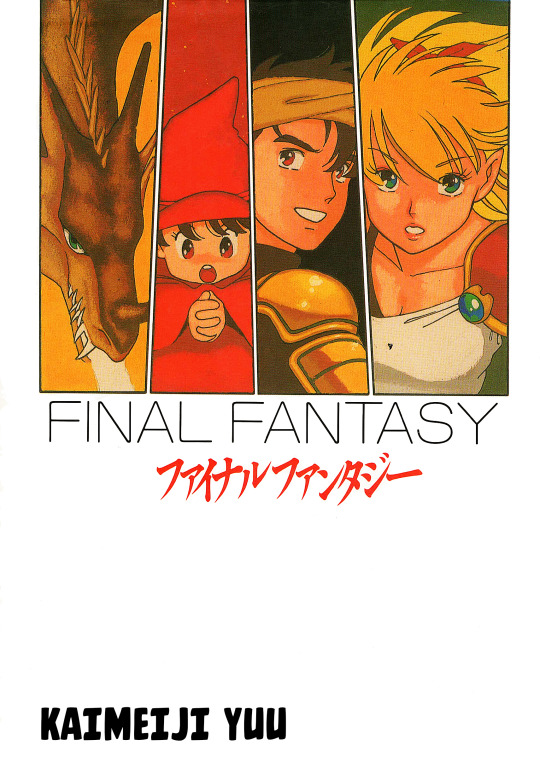
And, while a straightforward retelling of the original game, there are a few interesting elements in it. Elements that may seem somewhat familiar if you’ve Dissidia or Stranger of Paradise Final Fantasy Origin.
Before we begin, I’m going to be doing something different from my previous discussions: Rather than doing a summary/play-by-play of the manga, I’m mostly going to be talking about things I noticed, whether they be different... or indirectly indicative of where Square would take FF1 in the future. As that implies, I will be discussing spoilers for Dissidia and Strangers of Paradise.
For context: The manga was written Kaimejii Yuu and was released in 1989: 2 years after the first game landed on Famicom, one year before it arrived on NES and the same year as the MSX port. So rejoice Space Station!Flying Fortress fans.
Let’s start with one of the obvious ones:
The Party
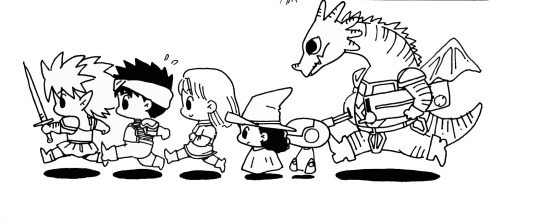
The original Final Fantasy centers around four Warriors of Light who mysteriously appear, each with a crystal fragment.
In the manga, we are introduced to the members of the party bit by bit: First, there is Puffy who seems to be a traveling Warrior.
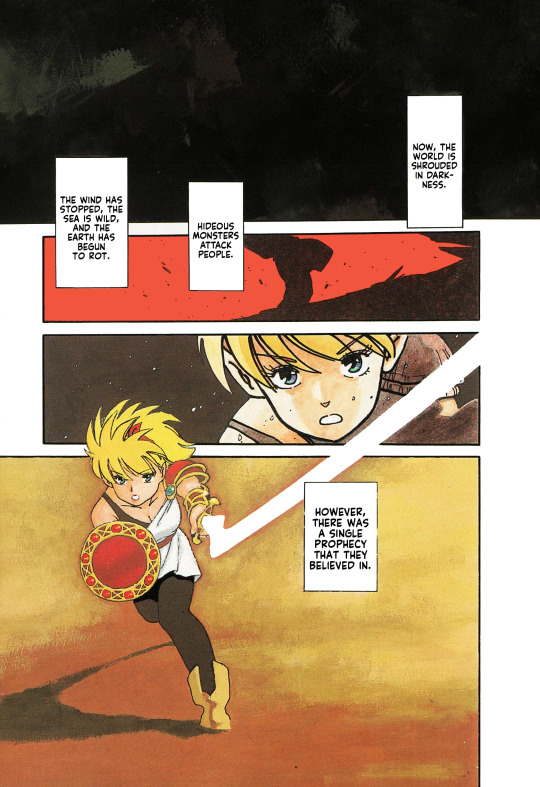
Puffy later meets Flitz/Fritz, a Monk who was kicked out of his monastery for his vices.

A Monk and a Warrior. Seems standard so far. But then there are the other 2 members.
Matoya, a witch who is skilled with black magic.
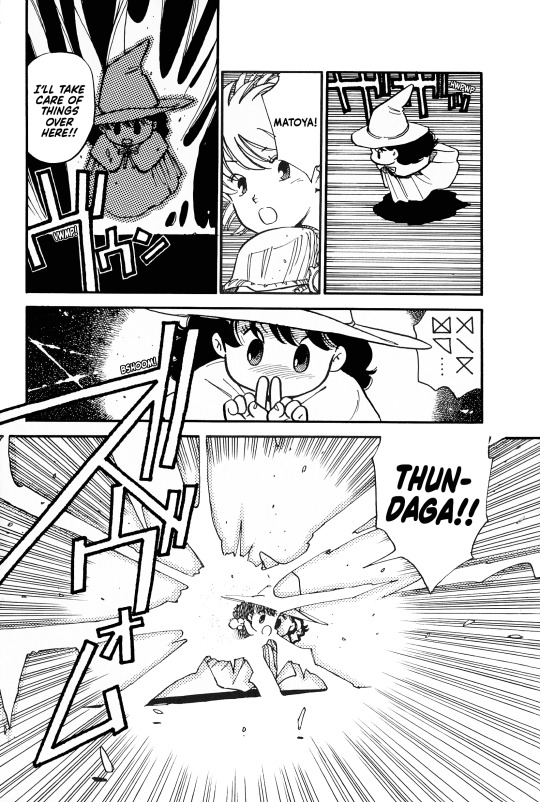
And the fourth party member... who isn’t introduced until quite a ways in. While Sarah and Bikke both join the party, the true forth member turns out to be none other than

Bahamut, the king of dragons.
Naturally, this is a pretty big deviation: Matoya and Bahamut are NPCs in the game after, but here, they’re main characters. Matoya would go on to be a prominent character in FF1, even being playable in spinoffs for what it’s worth. However, I don’t think there are many FF1 interpretations that put the NPCs in the WoL roles.
They’re not the only ones different, however
The Villains
The Final Fantasy manga follows a somewhat condensed version of the game. It’s actually kinda close to how Memory of Heroes did it, with the focus largely on Garland and the Four Fiends, concluding with a bout against Chaos.
Garland generally keeps his overall role, including his infatuation with Sarah (which makes me wonder what was the first media to touch on that aspect of him) but also has some significant differences: He doesn’t wear armor, he doesn’t seem to die before vanishing and the manga more blatantly sets up the plot twist by showing Garland entering the Dark Crystal. Only Flitz notices though, so he’s the first to realize that Garland’s behind everything once the Warriors learn about the whole she-bang from the Lufenians.
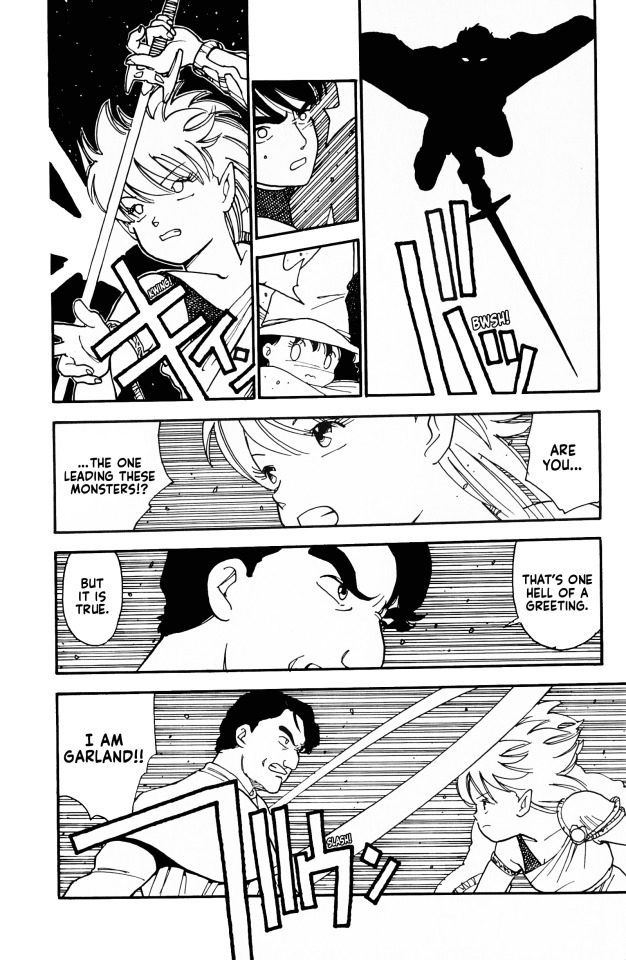
There’s also his name, but we’ll get to that.
The Warriors are promptly attacked by the Four Chaos/Fiends. There’s the Lich, who is looking positively Mobius!Chaos today.
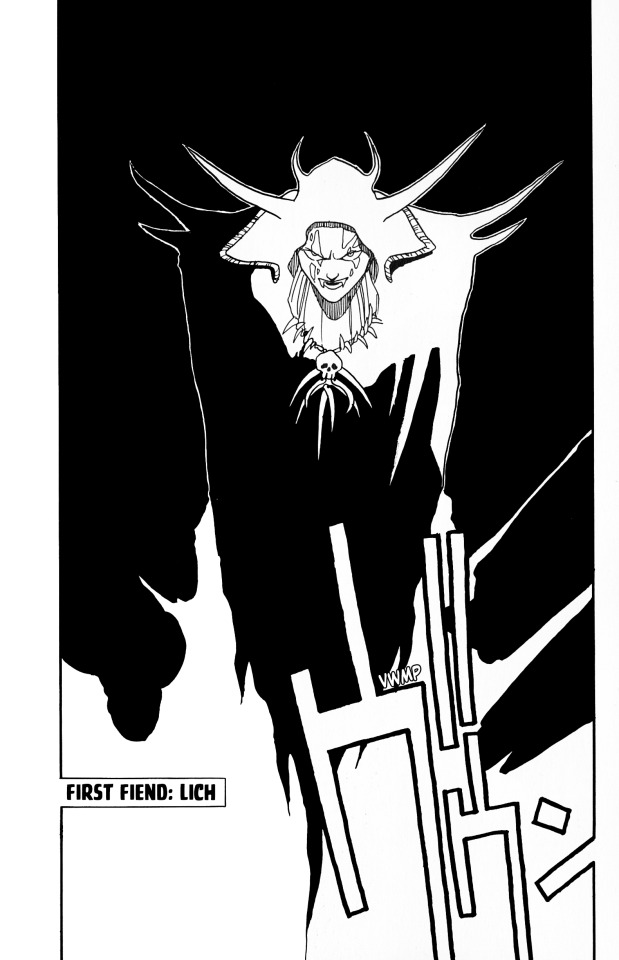
Then we have Marilith, who looks about how you’d expect.
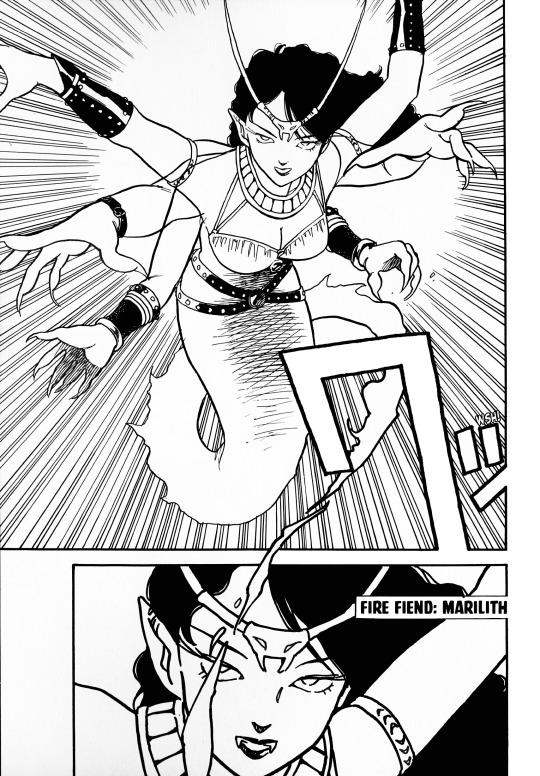
Then we have Kraken... Who is...

And last but not least, we have Tiamat, who has both a monster form and a humanlike form.

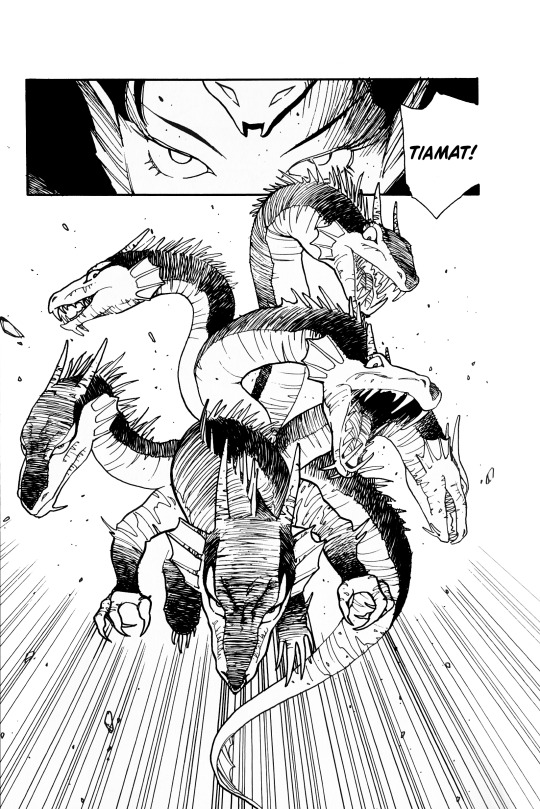
And then there’s Chaos, whose design is vaguely reminiscent of how Garland’s armor would evolve from Dissidia onwards mixed with traits from his Chaos form.
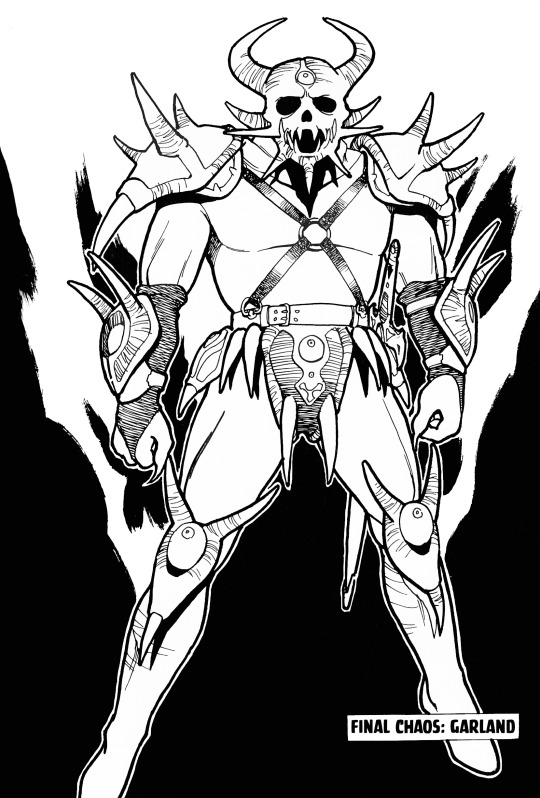
Oh yeah, Garland. Did you know that’s not his full name in this adaptation? Yup, long before “Jack Garland” would use the last name Garland, this Garland had the full name of “Red Garland”.

And here’s where we start to get into the influence that this manga may or may not have had on Square-Enix’s future interpretations of Final Fantasy 1.
The Backstory
In the games, the Warriors of Lights’ backstory is left unexplained. This plays into the role-play/”create a party” aspect of the game: It’s up to the player, if they so chose, to fill in the blanks about who their characters are and where they came from.
Memory of Heroes, being a close adaptation of the games, leaves its characters’ backstories ambiguous outside of tying a further connection to Garland as his time shenanigans “unchained” the Warriors of Light and wiped their memories, explaining why they can remember nothing and why nobody recognizes them.
Dissidia Final Fantasy, while not directly touching upon the events of FF1 itself, gives a backstory to its Warrior of Light: He’s a perfect manikin created by Cid of the Lufaine and placed within the cycles of conflict. Over time, he grows into more of an actual person and continuously comes to blows with Garland, who already knows him from the cycle back home. In the end, WoL ends up in the FF1 world and sets off on his journey, determined to not only save the world from Chaos but to free Garland from the endless cycle he unwittingly trapped himself in.
The manga, however, gives a more detailed backstory.

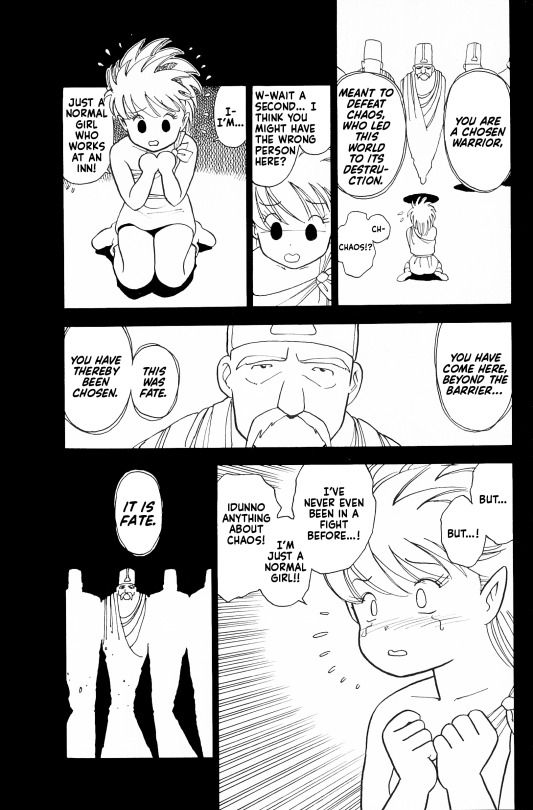
Early in Chapter 2, Puffy explains that she is not actually from that world; In another dimension, she worked at an inn and was just an ordinary girl. However, on her way to visit her friend Matoya, she winds up slipping through a dimensional barrier. When she wakes up, she’s surrounded by the circle of sages who explain the situation to her and send her off to fight Chaos, despite her attempts to argue otherwise. Puffy later meets up with a different version of Matoya, and soon after the manga begins.
This is largely forgotten about until climax, where it becomes much more important:

As one of Lufenia’s Knights of Gaia/Sky Warriors, one of the bats in the Chaos Shrine explains a bit further: It’s not just Puffy, all four of the Warriors apparently hail from other dimensions. The Knights figured that the best way to stop Chaos was to get four people from parallel worlds that Chaos did not exist in, resulting in heroes with fresh perspectives from worlds in which the crystals were not compromised. Thus they set up barriers that would link the five worlds together and the four Warriors of Light seen in the manga wound up being the four that were chosen (the manga mostly focuses on Puffy, but the implication is that Flitz, Bahamut and that version of Matoya all hail from similar parallel worlds). After Chaos is defeated, the four end up being sent back to their own worlds with no memory of their adventure. Puffy in particular goes back to being an innkeeper and serves drinks to various patrons... including Garland who, although rejected by Sarah yet again, has not turned into Chaos and is an overall decent guy.
What makes the dimensional stuff even more surprising is the meta aspect: Either great minds think alike, the parallel world stuff was in the Japanese FF1 or Square Enix took inspiration from this very manga.
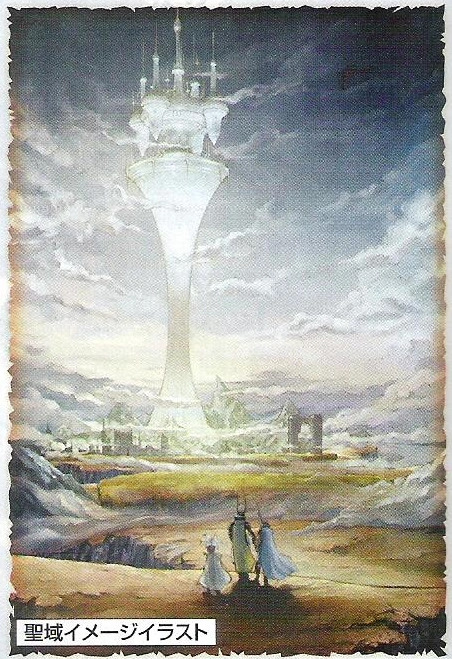
Dissidia Final Fantasy is a big fat crossover featuring the protagonists from the first couple games. While the first game was somewhat ambiguous, Dissidia 012 (the prequel) would establish that the game took place on World B: A destroyed parallel counterpart to World A, which is the world of Final Fantasy 1. The reports in 012 would also establish that Onrac stumbled upon a dimensional gate which would be how they acquired the ore that allowed them to produce manikins.
Stranger of Paradise takes the parallels even further. The concept of Lufenians drawing in people from parallel worlds to function as Warriors of Light was embodied in the Stranger Project. However, it turns out that the manga beat them to the punch with Knights of Gaia’s dimensional barriers. Of course, the KoG were benevolent compared to the SoP Lufenians who were malevolent. The concept of summoning warriors from other worlds would naturally be used there too, although in 012′s case, it’s due to Shinryu’s influence creating gateways.
And speaking of...
The Lufenians
The Lufenians are a simple, standard “Ancient Civilization with advanced tech (TM)” that was common in fantasy stories and would become a recurring trend in Final Fantasy, one that still remains even to this day. As far as plot significance go, they remain primarily in the background: They’re one of the civilizations the WoLs encounter their space station is the Semi-final dungeon and their champions were turned into bats that infodump a number of aspects about the overarching plot.
Then there’s Cid. In the original Final Fantasy, while the airship is said to be a Lufenian creation I think, I need to fact that that, there’s no mention of any particular Lufenian who created it. Later versions would name the Lufenian “Cid”, in keeping with series tradition of naming the prominent airship engineer “Cid”. Memory of Heroes gave a Cid a more prominent role, leaving behind video projections to show what happened to the Flying Fortress, entrusting the warp cube to the robots and burying the airship that the Warriors of Light find and use to travel in the later half of the story.
However, Cid’s actions are actually somewhat familiar.
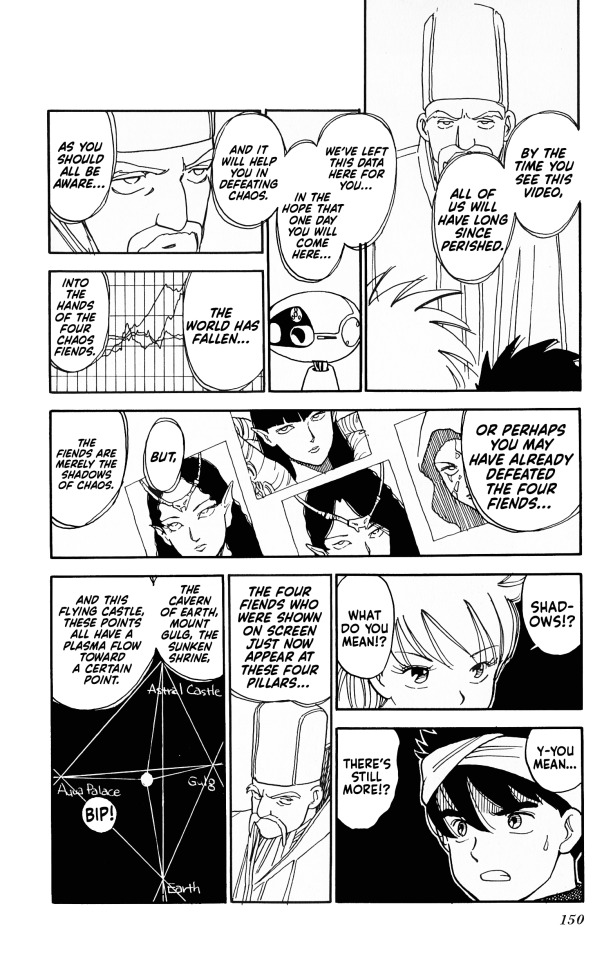
In the manga, a Lufenian (not Cid, though with the benefit of hindsight and how SE would’ve handled it, he may as well be) features prominently in the intro, leaves one of the robots to gather the warp cubes in preparation for the day the Warriors of Light arrive and leaves behind a video projection, with the man himself being long dead by then. Not!Cid’s exposition is different though, tying into how the energies from the four shrines can be seen converging on the Chaos Shrine from the Space Station as well as discussing the Knights of Gaia for a bit.
There’s also the dark crystal. In Final Fantasy, Garland is seen in front of a dark crystal in the Chaos Shrine. When the Warriors travel back to the past, they play the lute in front of the shrine, transforming the crystal into a portal. Stranger of Paradise would explain the crystal as being a “Dimensional Crystal Matrix”, sent to them by their unnamed collaborator.

Again, however, this is not the first time this has happened.
Turns out, the Dark Crystal in the manga is a “Time-Space Transfer Device”. The Knights of Gaia had used the device to set up the barriers to summon warriors from other worlds. However, Chaos took control of the device soon afterwards and used it to set up the time loop that would bring him to power. Coincidence or not, the manga Lufenians’ usage of the device would be echoed in the aforementioned two different aspects (the Dimensional Crystal Matrix and the Stranger Project). SoP would also echo the element of Garland taking control of the device for his own uses.
Conclusion
In the Stranger of Paradise Confidential Files -Secret Chapters- (An official complete guide - Thanks ChrysalisThoughts for the clarification! ), one of the questions posed to the developers is why Jack’s station is known as “Station 19″. While the final game has its own independent time loop, apparently it was named after SoP being the 19th time Final Fantasy 1 was ported/remade at the time, with the idea of different strangers being dispatched from different stations for each of the remakes.
While that plan ultimately didn’t fully pan out, the implication of Final Fantasy 1 having parallel worlds or a connection to other worlds in general is one that has echoed throughout the franchise.
- The Final Fantasy manga utilizing the concept of parallel worlds for its protagonists.
- The Souls of Chaos dungeons featuring prominent bosses from the other 5 Nintendo-era Final fantasy games.
- Dissidia introducing “World B” with 012 establishing it of being a parallel world to the world of the original Final Fantasy
- Memory of Heroes implying that the Warriors of Light of its three adaptations (and perhaps beyond) either inherit the will/souls of the previous ones or are the previous ones reincarnated in another world.
- And Stranger of Paradise’s original intentional of having parallel worlds, along with its hinted connection to World B
It’s looking more and more like a DC multiverse, especially if you flub things to suggest that each interpretation is its own parallel world.
But, in a way, it’s oddly fitting. Final Fantasy is a game that has you make your own party. The game gives no detail as to their character or backstory. You’re encouraged to fill in the blanks yourself, hence why fanfics and such can vary wildly with how everyone ca reinterpret the story. In a way, it’s fitting that SE themselves get in on it. And it’s interesting how, almost every time, multi-dimensional shenanigans manage to get involved.
I dunno.
I just think it’s neat.
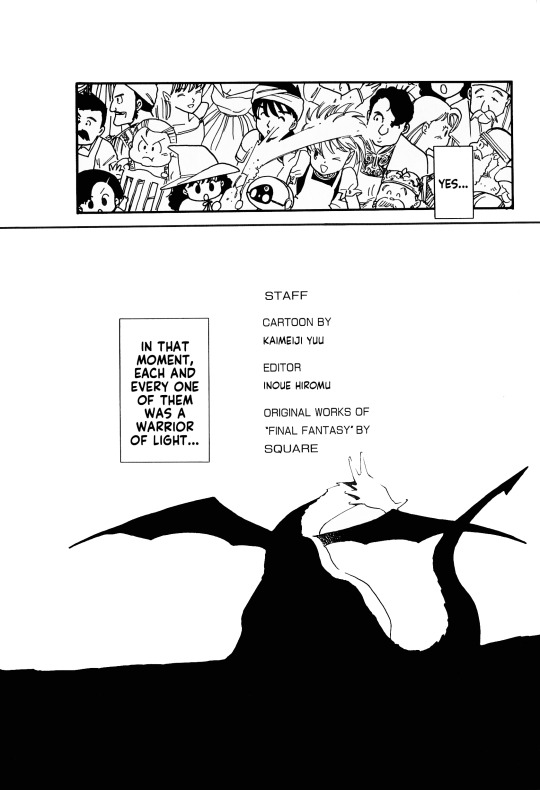
#Final Fantasy#Dissidia#dissidia final fantasy#Stranger of Paradise#Final Fantasy Origin#Long Post#Longpost#Memory of Heroes#Puffy Tolte#Flitz Stewart#Fritz Stewart#Garland#Matoya#Bahamut#Chaos#FF1#FFI
114 notes
·
View notes
Text

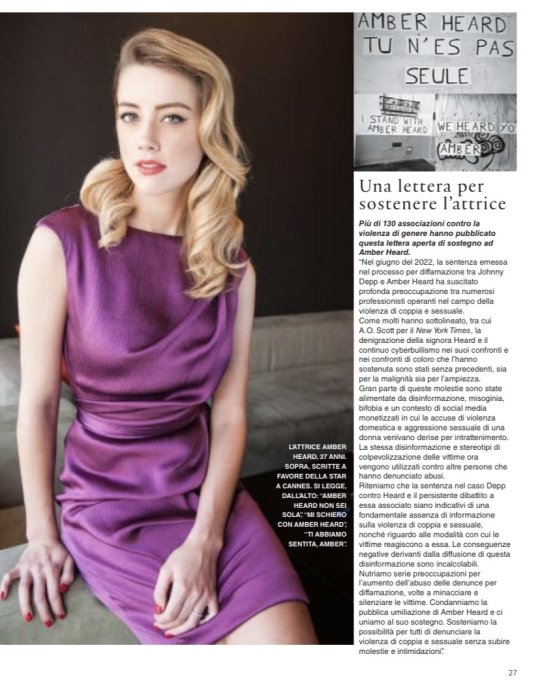
AMBER RESTARTS X FROM ITALY
After a long silence, Amber Heard returns with a film, presented at the Taormina Film Festival. At the center of the plot is a woman who is not believed. Just as it happened to her, who narrated domestic violence and was the subject of a hate campaign during the trial pitting her against ex Johnny Depp, triumphantly welcomed at Cannes only a short time ago
By Enrica Brocardo
A little more than a year after the end of the defamation trial that had seen Amber Heard and ex-husband Johnny Depp confront each other in the courtroom in Fair- fax, Virginia, and ended with the star's victory, the actress chose the Taormina film festival for her first public appearance.
Her new film, In the Fire, or In the Fire, premiered June 24, accompanied by Heard, who walked the red carpet that evening. Last May, on the other hand, it had been Johnny Depp's turn to indulge in a crowd at the Cannes Film Festival, where Jeanne du Barry - The King's Favorite, in which he plays France's King Louis XV, had been chosen as the opening film. Awaiting him was a winner-take-all reception, where it was the seven-minute standing ovation at the screening rather than sympathy for Amber that weighed in.
Yet this collective takedown somewhat contrasts with the entire court story, which actually ended in a draw of sorts. It is true that, in America, she was found guilty of defamation for an editorial she wrote in 2018 in The Washington Post newspaper in which she spoke about the harassment and violence she had suffered (but never mentioned her ex-husband's name). But it is also true that Depp had lost his previous lawsuit against the British newspaper The Sun, which, again in 2018, called him a "wife beater." Many wondered why two such similar prosecutions could end with two opposing verdicts. One of the reasons, according to an analysis by British lawyer specializing in Media Law Mark Stephens, is that while in Britain the decision was made by a judge, in the United States it was a people's jury that convicted Heard. "It reflected the judgment already made by the public opinion, which, from the very beginning of the trial, had stood up for Depp," the expert explained.
Another reason would be that the judge in the trial against the Sun had defused the strategy of the plaintiff's lawyers, namely to prove that Heard had lied on a few occasions in order to undermine his credibility, and had focused rather on the evidence of the incidents of violence against his wife. In Fairfax, conversely, Depp's lawyers had a free hand in discrediting Heard. Moreover, not only in the eyes of the jury, but of the world inter- not because the trial aired live on the web, resulting in a hate campaign against the actress that, a few months later, prompted her to leave Hollywood and move with her 2-year-old daughter Oonagh to live in Spain.
Meanwhile, late last year, the two exes reached an agreement whereby she would no longer have to pay over $10 million in compensation, but "only" $1 million, which the actor, in turn, said he would donate to charity. At the same time, alongside the actress, associations against gender violence and feminists lined up with an open letter (see opposite page) also signed a few days ago by French writer Annie Ernaux, who will be awarded the Nobel Prize in 2022.
In the Fire, which will hit theaters in the fall, is a supernatural thriller of sorts: the story of a psichiatrist who in the late 1800s is called in to take care of a child that people believe possessed by the devil. She tries to pit science against superstition but, even as a woman, is not believed. A more muted return to the scenes than that of Depp, who also recently signed a contract with a luxury brand. In short, refinding her place in Hollywood, despite the release of Aquaman and the Lost Kingdom next December, promises to be more complicated for Heard.
[ The open letter supporting Amber can be read here. ]
56 notes
·
View notes
Text
In his season on the French Revolution Mike Duncan lays out a pretty broad volley against Marxist historiography, which aligns with my understanding of broad critiques of that theoretical framework, as well as its applicability to the French Revolution. Basically that Marxian historiography looks attractive in the big picture and then loses in the details. Pretty familiar stuff.
I find his comment on this interesting - it's one of the first things that Duncan brings up in the first episode. While I'm sympathetic to the critique of Marxist historiography, which I would not necessarily describe as consistent in quality (much of it inheriting certain problems from theoretical antecedents, specifically a kind of morally inverted or modified Whig historiography and a reliance on stageism), the specific things that Duncan flags as problems for the Marxist narrative are the following:
Portions of the nobility were involved in early proto-capitalist development.
There were bourgeois defenders of aristocratic and noble privilege, primarily because they either had just bought into that privilege, or were attempting to do so.
But I think this only presents an issue if you assume that classes and all their members have to act unilaterally and cannot possibly have divergent or conflictual interests. Which just seems like a silly assumption we have no reason to make, nor to consider a fundamental tenet of a materialist or Marxist lens on historical events. Like, sure, the idea that the French Revolution is the inauguration of capitalism or brought in a political order automatically befitting a new economic order is patently false for a variety of reasons - but what we do see is constitutive parts of capitalism and liberalism appearing within a floundering social order. These constitutive elements were often introduced by feudal institutions (Louis XIV's centralization of political power and the variety of attempted but neutered reforms on law and finance by Louis XV and XVI's ministers), only for those new systems to benefit a class of people that wasn't actually responsible for making them. If Marxist teleology is wrong (and I think it is!), that doesn't actually mean that a materialist history, or a historiography based on class struggle, is wrong.
There's actually a pretty interesting Marx passage on this exact topic, in the section on primitive accumulation:
The industrial capitalists, these new potentates...their conquest of social power appears as the result of a victorious struggle both against seigniorial power, with its revolting prerogatives, and against the regime of the guilds, with the fetters it placed on the free development of production and the free exploitation of man by man. But the knights of industry only supplanted the knights of the sword by exploiting events not of their own making.
(Emphasis mine - when Marx says “appears” or “presents itself as,” it is usually quite notable.)
I remember I once said that liberalism is the political order and worldview birthed by a "nascent capitalism" and somebody disputed this because "liberalism predated capitalism" - which I think misses the use of the term nascent, how a lot of the constitutive elements of what we will come to refer to as capitalism were emerging within older social forms, and it is those emergent new political and economic relationships that encouraged the formation of new blocs of ideas. Like, Weber's argument about the relationship between the moral ideas of Protestantism and early capitalist development isn't unmade by highlighting how Catholic states and social formations were engaged in early capitalist enterprise. This point raises interesting and challenging questions that need to be further elaborated on, but to say that kind of detail disproves the analysis is to kind of misapprehend its object.
To some extent I think this is a problem with overemphasizing discrete moments and periods in history as "revolutions" rather than prolonged processes of social transformation, which Marxists definitely do. I dunno, maybe this is because I don't take "worldview Marxism" especially seriously, but I find it an odd critique.
24 notes
·
View notes
Text
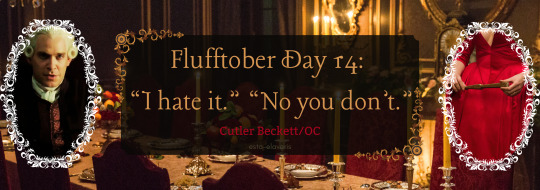
Flufftober Day 14: "I hate it." "No you don't." - Cutler Beckett/OC [2,799 words]
My Flufftober '23 masterpost can be found here 💜✨
I was trying to figure out how the hell to write Beckett in a romantic setting and my brain gave me toxic power couple, enjoy. This is more hurt/comfort with eventual kinda-sorta fluff than anything else, but I did my best and so no one can judge me xoxo

It was the evening of her husband’s farewell party before he departed for the Caribbean, and Lady Clara Beckett was a woman on a mission. She had been ever since her dear husband had announced he would not be bringing her with him when he set sail, citing that it was too dangerous and that there was no real need for her to be there - wording that had earned him a look that said more than an earful ever might. But good reason had failed, her discussions with him had been for naught, and he had resolved not to listen. So now, there was only time left for dirty tactics.
He had no right to be too cross about that. It was something he often revelled in, and while she couldn’t give him the credit in saying she’d learned it from him, watching his actions certainly encouraged her. Clara suspected he found it charming at times – but she knew tonight would not be one of those times. She wasn’t even sure she wanted it to be one of those times, her annoyance at now being bloody well listened to warring with her fury at how calm and impassive he was as she’d argued her case. No, she couldn’t quite decide if her plan for the night was with the aim of ‘winning’, or just of royally annoying him.
Although with two goals, she was more likely to achieve at least one of them, was she not?
Her maid did not seem to think so, if the silence in which she dressed her was anything to go by. Clara cared little. It at least saved her from any inane conversation – focused instead on the overall effect. Straight from the court of Louis XV, the gown was red silk, simple and sophisticated without frills or lace. Primarily because none was needed, as the neckline spoke for itself, dipping so far down that it exposed the curve of the pale, smooth underside of her breasts. Were she more well-endowed, it would’ve appeared obscene. Thankfully, she was fairly certain she could just get away with it.
Rubies dangled from her ears, bringing out the warmth of her dark locks where they were piled artfully atop her head, but when the maid brought out the matching necklace, Clara waved her away. It would ruin the effect.
With the maid dismissed thereafter, she had a moment alone to steel herself for what lay ahead. Standing, she inspected her reflection one last time and found that she rather liked what she saw, her dark eyes staring cooly back at her. Then, she took in a deep breath – and found it was a good thing they were throwing a dinner party and not a ball, for the dress would never remain in place for something like dancing – and then made for the door.
A footman was striding down the corridor as she stepped out, and when he saw her, he froze, and then did his utmost to keep his eyes firmly glued upon her face. Clara took that as a good sign, but kept any indication of that to herself.
“Lord Beckett?” she asked.
“His…study, my lady. Seeing to a handful of letters before your guests arrive.”
“Very well, thank you,” she nodded, and made her way there – her shoulders squaring and her chin raising more and more with every step.
Her husband was indeed in his study, alone behind the great mahogany desk, his eyes fixed firmly on whatever it was he was writing now. She knew not why he would leave any correspondence so late, but no doubt there was a reason behind it – there was a reason behind everything he did. They had that in common.
Stepping inside without announcing herself, she swept her way towards the chair before the desk and sank casually into it, leaning back and watching him with great patience. He looked up, his quill stilled, and a great splotch of ink fell down atop the letter.
Clara smiled. Cutler did not.
“Absolutely not,” he said firmly.
Only once he’d managed to lift his gaze to her eyes.
“It’s from Paris,” she said, her tone light.
“Then the French can let their wives wear them. Change, Clara. Immediately.”
“Take me with you to Jamaica. Tomorrow.”
Realisation hit him then – visibly, his jaw clenching as he heaved a great sigh, leaning back in his chair as he considered her like she was some new great opponent. His head was already in whatever games lay ahead, then. Or perhaps he simply saw her as good practise. There was something flattering in that.
“No,” he said.
Clara shrugged.
“Then it appears we’re at an impasse.”
“So that’s your plan, then, is it? To flounce around showing me precisely what it is I’ll be missing, as if I’m not already well aware?”
His tone might’ve been scathing if not for the certain note of excitement threatening to slip through his annoyance. He did so enjoy their little games.
“You, and everybody else,” she smirked.
Annoyance prevailed then, for he seemed to like that notion even less than his first assumption. Much to her delight. It wasn’t so much, she knew, about the prospect of other men seeing and desiring what was his – for what good was a beautiful wife if not for that very purpose? So long as she never let them think they had a chance in hell (and they never did – infuriating as he was, she was rather fond of her husband), he liked that aspect of things. No, his reservations here would lie in what his leaving behind a woman such as her suggested about his wits. Which was exactly what she intended. She wanted everybody to look at him tonight, after looking at her for a good long while, and wonder if he’d lost his mind in deciding to let her out of his sight.
“Change your dress, Clara,” he ordered. “You have countless other very becoming ones. Choose one of them, and wear that instead.”
Flattery would get him nowhere. Downstairs, the sound of the servants admitting the first of their guests into the house echoed throughout, and her smiled shifted into a smirk as she rose to her feet.
“Would you look at that? I’m afraid it’s too late.”
Turning, she strode to the door of his office before pausing and turning back to him, drawing herself up to her full height as she posed with all the elegance she could muster. Which, as it was, happened to be rather a lot.
“You haven’t said what you think of the dress.”
He scowled at her. “I hate it.”
Clara grinned, seeing through the assertion immediately – rather helped by how, despite his protests, his eyes were glued to her figure.
“No you don’t,” she said.

Their guests were more people whom they were supposed to like rather than those they really held in any high regard. Then again, did anybody really like anybody in London? Neighbours, business associates, and not quite anybody who would be offended at the lack of an invite but instead those whose offense would actually matter, should it come to that.
Lady Clara Beckett greeted them all warmly, tittering appropriately over the origins of their silverware, or the sofa on which they sat as they waited for dinner to be served, or the year on the fine bottles of wine served – and, of course, the dress.
If Cutler was still cross with her (which she knew he was) he did it almost immaculately well, engaging in small-talk over his upcoming journey, talking in serious tones about the threat of the pirate problem, and humming with a great deal of false humility over what his chances may or may not have been at stamping it all out.
Of course, she said “almost” immaculately, for there was one sore spot. One of his good friends – or allies, rather – a fellow Lord, had seen fit to bring his son along with him. Said son was but a year older than Clara, and had presented a rather strong case for her hand way back when she’d still had to endure things like courting and what her potential prospects were. Alexander had never had a chance at “winning” her, but he didn’t seem to know that. Nor did he seem to have much care for his own wife – a boring little Blowsabella who scarcely seemed able to say three words without blushing, as though fearing they were the wrong ones, leaving Clara pitying the lobster that had to die to feed such a bore tonight. Instead, Alexander instead spent much of the evening all but glued to Clara instead, doing his utmost to be charming.
To his credit, he was rather good at it.
No doubt he smelled blood in the water, knowing her husband would soon depart and leave her alone for what could be years.
The evening was a roaring success, as all evenings she put together were. The conversation flowed nicely, dinner was impeccable, and the drinks that followed were so jolly that they were all very reluctant to leave thereafter. She had to suppress a smirk when Alexander’s father leaned in close to Cutler as he left, his face flushed with drink, saying in what he likely thought was a whisper.
“You must be out of your mind to leave a woman like that behind, my dear fellow. Out of your mind!”
His son looked very self-satisfied to hear it, shooting her a look that could only be described as scheming as he herded his wife out of the door. It closed behind them, and she knew her husband had caught the look thanks to how his hands curled into fists at his sides.
“That went rather well, I thought,” she said happily.
“I suppose you were particularly pleased with those parting comments at the end, there,” his tone was scathing.
It rather warmed her.
“If the opinions men hold over your decision to leave me behind bothers you so greatly, perhaps you might rethink those very actions in the first place. When has what others said ever bothered you when you knew the course of action you were taking was the right one?”
“Perhaps the opinions of others bother me when those opinions were cajoled by my wife behaving like a common whore! Perhaps it’s not my present decisions that concern me, but instead the decision I made not one full year ago when I chose such a woman over one who would know her place and do as she was damn well told!”
Silence hung in the air when he was finished. Clara was content to let it remain there, watching him without respond, allowing him to fully consider precisely what it was he’d just said to her. For the first time ever – in all the time that she’d known him – her husband looked alarmed, the fury slipping from his face like rain from a windowpane.
“Clara…darling…” he sighed.
Darling, was it? He only broke out the terms of endearment in truly dire circumstances. Her expression must have been thunderous, then.
“I wish you safe passage on your travels, husband. I’m rather tired, so I’m afraid I won’t be awake to see you off come morning. You may write, if you so wish,” her tone was clipped, and there was a finality to her words.
Although it would be a good long while before he got any response beyond what was entirely necessary – information as to the running of the household, and so on.
The only way she allowed her temper to shine through was in how she snatched her hand away when he reached for it, rising to her feet and leaving the room. The maid noted the curl of her lip and her silence well enough, dressing her for bed and binding her thick dark hair into a long plait behind her head with no attempt at chit-chat, finally leaving the room swiftly thereafter.
Once the door clicked shut behind her, Clara rested her elbows atop the vanity and sighed heavily. How dare he? More infuriatingly still, he’d left her feeling as though she had done something wrong. Not in her manner of dress – she would wear whatever she damn well pleased within the bounds of good taste and propriety. And what did men know of fashion, anyhow? No, what she was questioning was the goodbye she'd offered. Paltry. Cold, even, considering it would be at least a year before they saw one another again. More, conceivably.
But what else could a man expect, upon likening his wife to a whore? And as for his other assertion – the mere suggestion that he’d ever be content with some insipid little fool who simpered and smiled and did not know precisely who and what he was. It would have been hilarious, were it not so insulting.
She been lying in her bed, glaring at the canopy for some time when a knock sounded at her door. Instantly she knew it was him, despite the fact that he never knocked. So she rolled over and put her back to the door, just in time for it to open. Footsteps, muffled by the rug, drew near and then the bed behind her sank as he sat down.
“I’ve spoken to your maid. She believes she can have your belongings packed and ready to go come morning.”
Clara scoffed.
“To what end?”
“You are my wife. Your place is by my side.”
“Yes, well I’m sure there’ll be many bored ladies in Port Royal eager to warm your bed when you make port, so you shan’t miss me. You said it yourself, I do not know my place. I should hate to change that now.”
“You know that isn’t true. None of it.”
“An hour ago, I might’ve thought not. Then, however, you likened me to a whore and everything was made quite clear.”
“You’re coming with me to Jamaica. Would I decide that if I thought you a whore?”
“I suppose it depends on the hourly rate. I’m not going.”
“Clara.”
“I’m not. And I’m not just saying it so that you might convince me otherwise, I’m saying it because I know you changed your mind solely to stop me from being cross with you. I don’t want to win – not anymore. Not that way, in any case. I’ll get up in the morning and see you off if that’ll convince you that I mean it. But I will not go.”
The bed behind her rose, indicating he’d stood, and something within Clara seized up – devastation outweighing the relief that he’d finally listened to her. But then he rounded the bed instead, coming to sit before her. She could not roll onto her other side without the display bordering on the ridiculous, so she forced her face to remain stony as she regarded him. He’d undressed before coming here – now in a nightshirt and devoid of his wig. It was almost easy to forget who he was, and what he was capable, without all of the finery and the accoutrements that went into Lord Beckett being Lord Beckett, his dark hair sticking up here and there.
She would not allow herself to be charmed by it; for that was likely his intention.
“Come with me to Jamaica,” he said. “Please. Not because you’re cross, and not because it shall mean you have won, but because you are my wife, and I’ve little wish to spend the next year or more without you. Tonight has shown me that well enough.”
Clara stared, pushing herself up so that she was sitting upright. Because he never said please. He’d proposed with less heart than what he’d just shown now. Her eyes lowered, and she angrily urged herself to get a grip – a fire blazing in her gaze when she met his eye again.
“Never use that word to refer to me again,” she warned.
He weighed the response, nodding slowly and then finding her hand amidst the covers. “So long as you never grow predictable. So long as you never bore me.”
She could promise well enough that she’d never do that. Based on the rueful smirk on his face as she slid over to admit him into her bed, he knew that well enough.

Links: AO3 -- FF.net -- flufftober masterpost -- dividers by cafekitsune
#esta's flufftober '23 fills#flufftober 2023#flufftober2023#cutler beckett/oc#cutler beckett x oc#pirates of the caribbean fic#potc fic#pirates of the caribbean fanfic#pirates of the caribbean fanfiction
33 notes
·
View notes
Text
xv. echoes of yesterday
☾⋆。𖦹 °✩⋆。° ✮
CHAPTER FIFTEEN ─ echoes of yesterday.

❛ if i may just take your breath away,
i don't mind if there's not much to say. ❜
Narrator's Perspective
"Eunyoung?" Inhyuk called out her name as she turned to look at him, "I thought you might be here."
Eunyoung stared at him blankly for a few moments, trying to figure out who he was, until she realised he was Inhyuk. Her eyebrows shot up in a moment of realization, "Oh it's you, Inhyuk! You were at Sunjae's swimming competition, right?"
"Yeah that's me," he breathed out, "I'm surprised you remember."
"I have a good memory," Eunyoung smiled politely, "Sunjae stayed over at your place, didn't he?"
Inhyuk nodded in agreement, "You're right, he did. He didn't come to school today."
"I figured," there was a bittersweet taste on her tongue as she recalled the various events of the previous day, "How's he feeling? He was heartbroken yesterday; first the doctor's words then his father's..."
"He won't tell me anything," Inhyuk complained, frowning, "He only told me about his shoulder."
"He couldn't get himself to talk to his dad about it," explained Eunyoung, looking down as she recalled the conversation she overheard, "Can you try to get him to tell his dad? He needs to know. Sunjae might act tough, but these are though times, and he needs all the support he can get."
"I will," Inhyuk assured. After a pause, he added, "Sunjae's really grateful for your support too. He didn't say much, but he mentioned how you were there for him. I wanted to say thanks from his behalf."
"There's no need to thank me," Eunyoung smiled, "What are friends for?"
Kim Taesung's Perspective
I caught a glimpse of Yumi from accross the fence dividing the boys and girls schools. My gaze fixed on her face; Her long hair fell messily on her shoulders, the breeze sending a few strands flying in random directions. A wide smile lit up her face as she laughed with her friend. The cigarette from my hand fell to the ground as my grip loosened without meaning to. Its soft thump on the pavement broke my focus and I put it out with my foot.
The lunch bell clanged, jarring me back to reality. I blinked, the bustling crowd of students a harsh contrast to the empty space where Yumi had stood moments ago. My feet, traitors that they were, hadn't moved an inch while I was lost in the memory of her. An inexplainable feeling lingered in my heart, recalling the last time I encountered her. Her hair seemed to fall perfectly and her face seemed to be sculpted by the gods.
"Maybe I should quit smoking..."
💿
I found myself becoming increasingly foolish as I acted on impulse rather than rational thinking. To be fair, I had made quite a few impromtu descisions that didn't turn out in the best way; But this was different. Since I started taking my motorcycle to school, I had always taken a shortcut, which allowed me to reach home within fifteen minutes. It was quick and convinient, and it had worked for me.
The final strains of band practice faded into the background, a dull ache settling in my fingers from the worn strings of my guitar. Today, however, the usual post-practice routine held no appeal. Instead, a strange compulsion tugged at me, leading my feet towards the unfamiliarity of the music club exit.
There, I lurked like a lovesick fool in a bad spy movie, trying my hardest to appear nonchalant. Every fiber of my being screamed "obvious stalker," but dammit, if my Oscar-worthy performance didn't deserve an award.
The bus doors hissed open as Yumi momentariy dissapeared from my sight. My heart hammered a frantic rhythm against my ribs as I raced to my bike, a silent vow forming on my lips. "Stay cool," I muttered, the words muffled by the helmet that encased my head. "Just a casual bike ride on a beautiful day, nothing suspicious to see here."
Except, the day wasn't particularly beautiful, the traffic was a congested nightmare, and my definition of "casual" had never involved weaving recklessly between lanes, desperately trying to keep the bus in sight. Finally, a sliver of victory – I found myself gliding beside Yumi's window, mirroring her movements on two wheels.
A ghost of a smile played on my lips, hidden beneath the confines of the helmet. Her profile was a masterpiece, framed by the bustling cityscape. Yet, a pang of guilt twisted in my gut. Was this the kind of guy I wanted to be? A creepy stalker on a bicycle? Or maybe, just maybe, there was a fine line between devotion and desperation, and I was teetering precariously on the edge.
Narrator's Perspective
"Since mom wasn't home last night, Sunjae and I came upstairs. We sat there talking for sometime, and then it almost seemed like he was going to..." Eunyoung's voice trailed off as the scene replayed in her mind. Warmth crept up her face, recalling their proximity. Thinking of the moment now felt like it was a fragment of her imagination as she questioned whether it really happened. The real question, a silent scream echoing in the chambers of her heart, was: had she truly fallen for him? This wasn't the blind adoration she'd felt for him back in her "Eclipse" phase, a time when his brooding good looks and mysterious aura had captivated her from afar. This was different. This was a closeness born of shared secrets, whispered conversations in the dead of night, and a connection that transcended the superficial.
"What?" Yumi inquired, itching with curiosity, "Can you stop trailing off like that? You've done that too many times. I'm starting to question your storytelling skills."
"Nothing," Eunyoung evaded the topic entirely, not wanting to get caught up in her emotions, "It's not important. I'm really worried now. Can I really change things? Do I have that kind of power or was I lying to myself this whole time? I'm afraid of loosing him now more than ever. I'm scared, Yumi."
Yumi placed a supportive hand on Eunyoung's shoulder, "You really think it was a coincidence that you came here with the help of Sunjae's signed CD after Sunjae's death? It's not over yet, trust me."
☾⋆。𖦹 °✩⋆。° ✮
nayoung's notes: yumi being the supportive bestie that she is. hope u liked thiss!
delphi's notes: fRiEnds you sayyyy.
next chapter: saturday (out now!) (sorry for the late update)
list of chapters here!
#( +🎧 ) nayoung ?!#— nayoung's writing#TOWARDS YOU — lovely runner.#lovely runner#lovely runner fanfiction#lovely runner x oc#sunjae#ryu sunjae#ryu sunjae x oc#kim taesung#taesung x oc#song geonhee#byeon wooseok#song geonhee icons#kim taesung icons#taesung icons#minji#kim minji#newjeans minji#minji icons#headers edited by me :)
4 notes
·
View notes
Text
TWST Student OC Profile - Devlin Ether Cepheus
"Above all, I'm just a man." - Noctis Lucis Caelum

Devlin theme song
Personal Info
Name - Devlin Ether Cepheus
Title - Prince Ether
Age - 18
Birthday - 8/30
Zodiac - Virgo
Gender - Male
Species - Human(Partially Shadowblood)
Height - 176cm/5'ft9"in
Eye Color - Sky Blue(Right eye often turns red to yellow)
Hair Color - Midnight Blue
Orientation - Demisexual
Homeland - Kingdom of Ether
Family - ?? - Father
?? - Relative
Twist of Noctis Lucis Caelum from Final Fantasy XV
College Info
School - Royal Sword Academy
Dorm - Crystaleon
Year - 3rd
Best Subject - Ancient Magic,Physical Education


Other Info
Occupation - Prince,Pro Fisher
Favorite Food - Grilled Wild Fresh Fish
Likes - Fishing,Video Games(When Allowed),Chocobos,Pet Animals,Fish,Swimming,Boats,His Car,Assassin Aesthetics,Long Naps
Dislikes - A Certain Bird Mascot,Vegetables,Most Bugs,Being Startled,Snakes,How Quickly He gets Tired,Not Being Allowed to Drive,Foggy Weather,His Past
Talents - Fishing,Weaponolgy,Elemental Magic,Chocobo Racing
Unique Ability 1 - “King's Blade” - Can call upon an assortment of blessed weapons to his hands,only one at a time and once a day. Doing this is extremely exhausting to him so he must nap or sleep right after doing it.
Unique Ability 2 - “End's Call” - If Devlin is ever in danger where his life is seriously at risk,both his eyes will turn glowy red and a random giant monstrosity/humanoid being will appear to shield or escort him away to safety then vanish. Only one has ever been nearly seen but hidden in a thunderstorm,rest are unknown.
Personality - Often withdrawn from most around him unless his close friends or something he is interested in a lot. He holds a lot on his shoulders and rather just ignores it for now and focuses on other things he finds cool. Very laid-back and sleepy as well as he is like a cat. If he can find a place to curl up he will. Is pretty socially awkward and oblivious to random people generally wanting to speak or flirt with him. Can talk about fishing for hours but that can bore quickly if you don't like it too.
Bio - The reckless little prince of Ether. Lover of fishing and time wasting. Father grew a bit annoyed he wasn't doing much back at the kingdom and was gaining too many lazy traits so made him enroll into RSA so that he can maybe gain some better traits and also socialize with those his age. Devlin has already studied a lot given his childhood so isn't taking this too seriously and mostly still just silently vanishing to fish and not talking to anyone much. There are things others do that interest him so he isn't fully uninterested in everything.
Other Notes
As a child for most of his life as one Devlin was bedridden and unable to walk so always was taken around the castle either in a wheelchair or being carried by his caretakers.
While his dorm is technologyless Devlin was raised around smartphones,video games,and tv as a way to keep his mind active when he was bedridden as a child. He rather perish than to not play his mobile gacha/action games so the main reason won't find him at the dorm is cause he elsewhere doing that to not get caught.
Has a ring that often will see him stare at while rotating on his finger. The glare he will briefly give you if notices your looking is spine chilling but also theres a sadness to it.
His right eye is constantly going from sky blue,red,orange,and yellow colors depending on either mood or something else. He doesn't know why it's always been a thing his father said don't worry about it. When Devlin relaxes or is asleep it is his natural blue color.
If he gets severely angry to a point,both his eyes go black sclera with yellow pupils and will see crystal/scale-like pieces form on his arms and face as if he is changing into something else but doesn't finish as body isn't strong enough for whatever is happening and he falls unconscious for days to weeks.
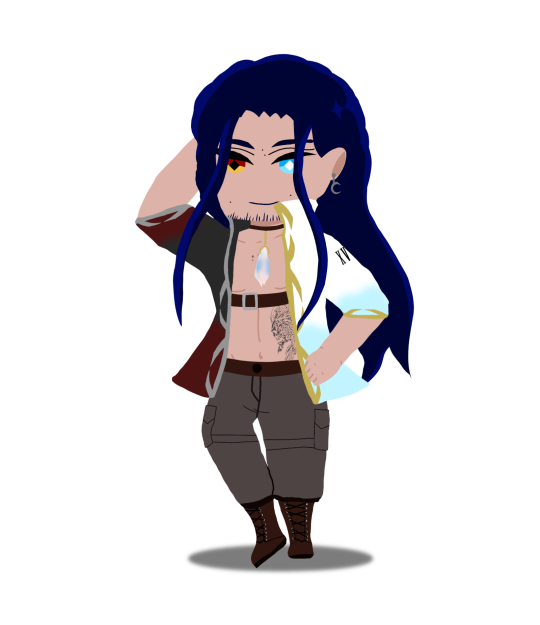
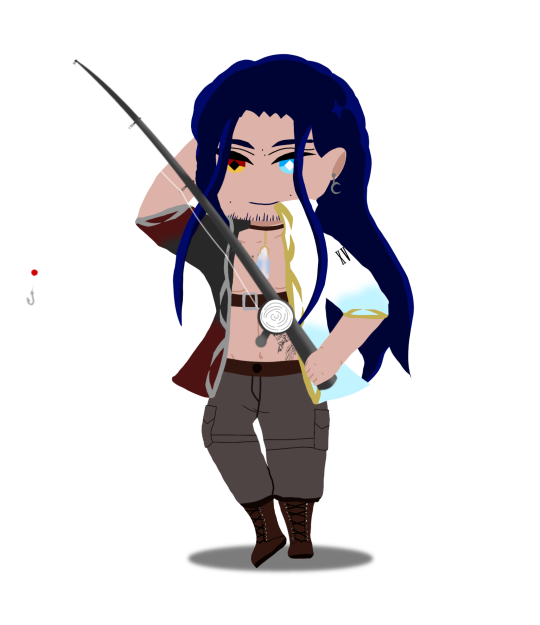
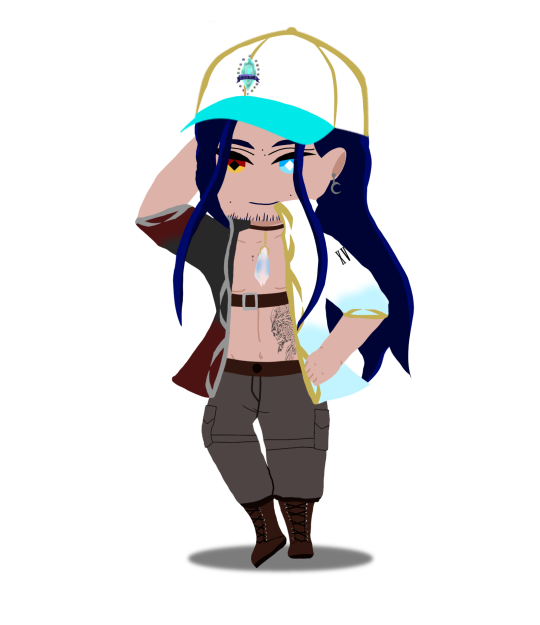

#twisted wonderland#twst oc#twisted wonderland oc#rsa oc#twst rsa#twst fandorm#crystaleon#devlin#prince oc#final fantasy xv#final fantasy xv noctis#noctis lucis caelum
11 notes
·
View notes
Photo
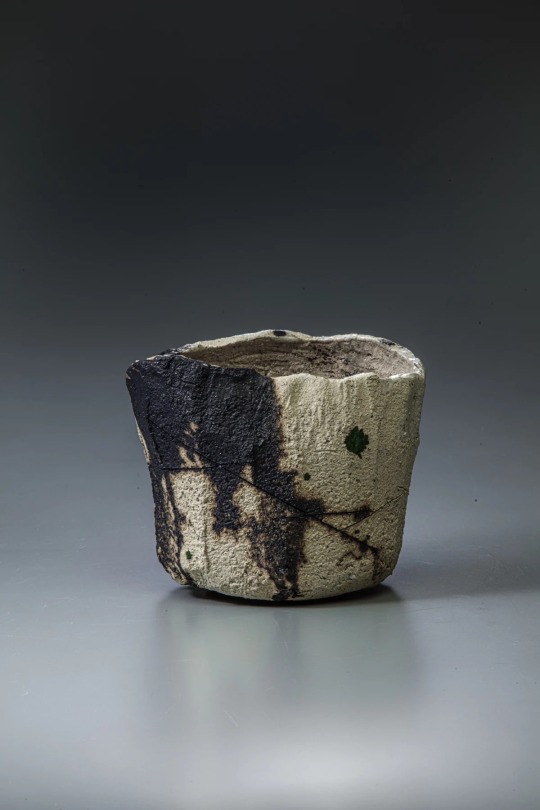


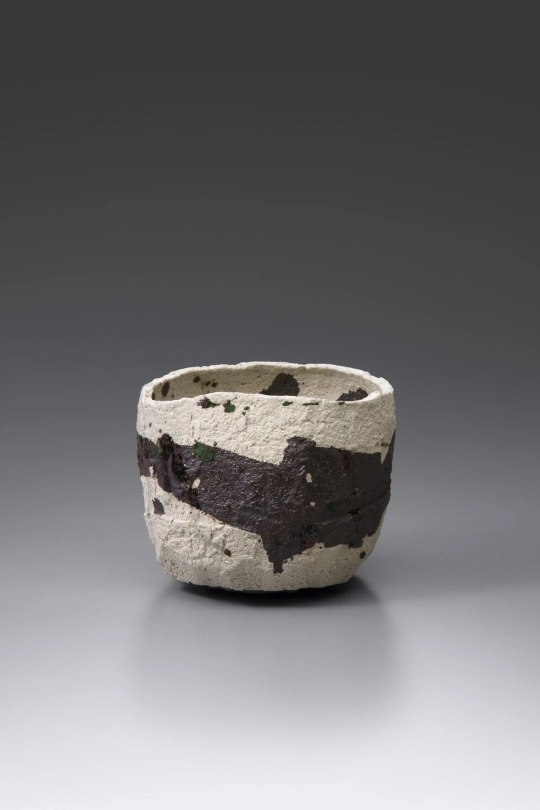
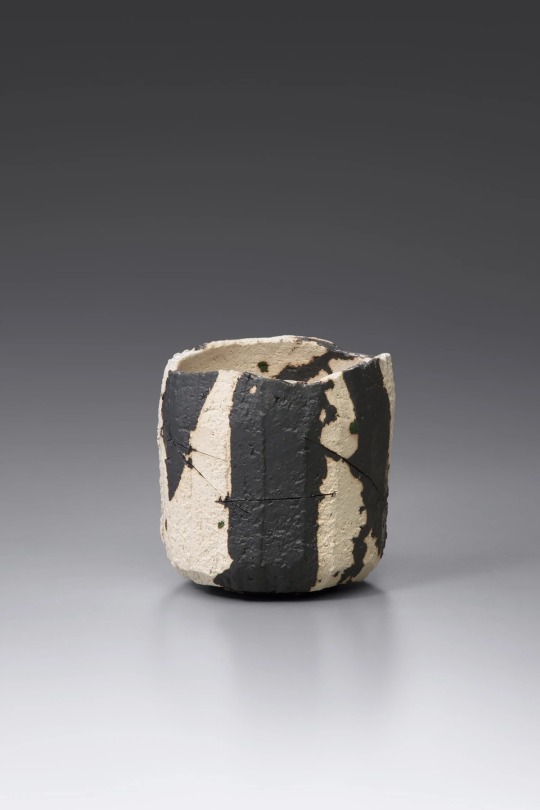
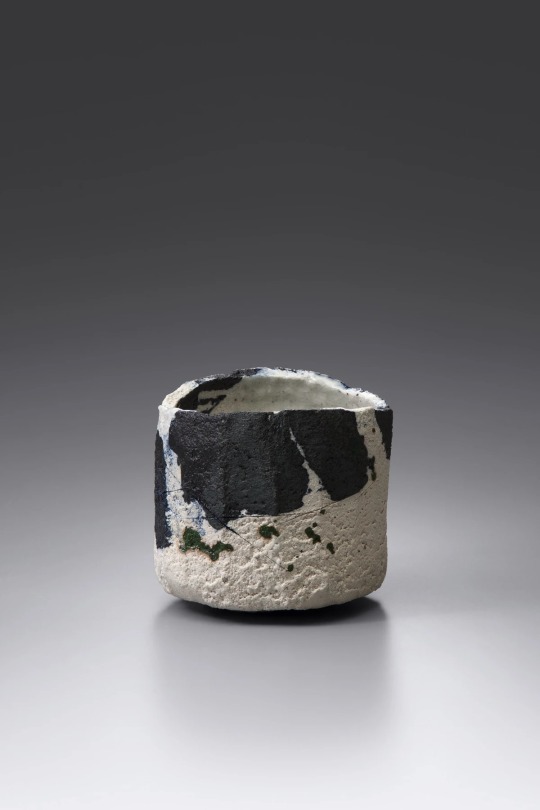
Raku Jikinyū, “White Rock series”
Raku tea bowls are shaped by hand rather than being thrown on the potter's wheel and are drawn from the kiln at the height of the firing so that they cool rapidly in the atmosphere outside.
Their purpose is for drinking whipped tea (matcha) in the tea ceremony (chanoyu).
Typically either monochrome red or monochrome black, Raku tea bowls were considered radically avant-garde when they first appeared in the late sixteenth century. They were synonymous with the ideals of the wabi style of tea ceremony pioneered by the renowned tea master Sen Rikyū (1522-91).
The Raku family has lived and worked on the same plot of land in Kyoto since 1586. Jikinyū succeeded to the family headship as Raku Kichizaemon XV in 1981 and assumed the name Jikinyū when he retired in favour of his elder son, who became Raku Kichizaemon XVI in July 2019. He has devoted his career to exploring the possibilities of the traditional tea bowl format in a constant search for new modes of expression.
His tea bowls are characterised by bold sculptural trimming and the creative use of the yakinuki firing method.
Courtesy: Annely Juda Fine Art
#art#design#raku#wabi-sabi#japan#raku jikinyu#tea#bowl#matcha#chanoyu#ceremony#black#wabi#style#history#sen rikyu#kyoto#sculptures#annelyjudafineart#sai#clarity#tan#ryu
115 notes
·
View notes
Text
Eclipse: Chapter 15
Fandom: Trials of Apollo
Rating: Teen
Genre: Family/Adventure
Characters: Apollo, Hades
This is a chapter I've been looking forwards to for a while! It's also the first chapter to breach 5k words (but not the last...)
I have a discord server for all my fics, including this one! If you wanna chat with me or with other readers about stuff I write (or just be social in general), hop on over and say hi!
<<Chapter 14
APOLLO XV
Awake or asleep?
Not that it matters when it’s
A dream anyway
Asclepius dragged himself out of the Pit with trembling, ichor-stained arms and took a moment or several to recover once he had crawled far enough away from the Pit’s black hole-like vacuum. It was the sort of dishevelled appearance most gods would never let themselves be seen in, but given the circumstances, it was clear that the former demigod had no choice.
He certainly didn’t have much by way of strength left.
When Apollo had closed his eyes, pain and a weariness he’d never felt before (as a god – mortal exhaustion was something else entirely) sapping his strength to the point he’d been unable to fully conceal it from the observant eyes of his uncle, he hadn’t expected to find himself watching his son make his final escape from Tartarus, but he couldn’t say he wasn’t happy about it.
It was a massive relief, to know that Asclepius was – or soon would be, if this was a glimpse of the future rather than a dream of the present – out. Safe was not necessarily so obvious; Hades had promised protection, but Hades was not the only god who operated in the Underworld, and Apollo could do nothing but hope that what concealing power Hades had granted his son would be enough to avert the eyes of other gods, who might not be so inclined to keep Asclepius’ new location to themselves.
In Tartarus himself, despite his minds’ eye’s current view, there was nothing Apollo could do save be a silent observer as Asclepius hauled himself to his feet, staggering like a drunkard complete with a shaky hand pressed to his forehead as though nursing a severe headache, and took one near-blind step after another, away from the Pit and towards the throng of the Underworld.
More than once, he almost fell, and Apollo longed to reach out and catch him as he stumbled sideways, barely catching himself, but he couldn’t.
Despite never having been to that part of the Underworld before, Asclepius headed unerringly towards Hades’ palace, one dogged step after another. Apollo recalled that part of what Hades had given him was a draw of sorts, guiding his battered form towards the safe haven come prison he was expected to reside within until Apollo and Hades returned from their own Tartarus excursion.
Circling in the sky, or what passed for it in the Underworld, Apollo could see the Erinyes swooping down into the Fields of Punishment, and then back up again to the sound of eternal screams. Many people, both fictional and not, had called screams music, but the agonised sounds of souls in eternal torture did not, in Apollo’s professional opinion, count.
It was more akin to fingernails across chalkboards, a grinding, sharp sound that reverberated all the wrong ways through his essence, and he suspected the grimace on his son’s face was at least in part caused by the noise.
Thankfully, either due to Hades’ influence or their own distraction, none of the three sisters appeared to notice Asclepius as he traipsed past the Fields at a sensible distance, carefully keeping his head down.
Compared to Tartarus, where time flowed strangely and distances seemed to vary on the whims of the Primordial, the Underworld was as linear and static as the Overworld. It should have been easy to track how long Asclepius took to traverse the Underworld, but despite his vision being focused entirely on his uncle’s realm, Apollo, still in Tartarus, could not quite grasp the scale of time. He could, however, see that the ichor was slowly disappearing. The Underworld was not the Overworld, but it certainly wasn’t Tartarus. Gods had access to their own power, almost as strong as when they were in the Overworld (barring the Chthonic gods, whose power was of course at its zenith in the dark caverns of the land of the dead), and to Apollo’s great relief, Asclepius’ healing abilities were thriving in their new comparative proximity to the sun, to life, as ironic as that seemed.
By the time he reached the gates of the palace, he at least looked every inch the god he was. Apollo could sense weaknesses still, but they were beneath the surface, locked away where they had to be searched for to be found. The ichor stains were gone, and so too were any remaining traces of a decrepit old man.
Apollo had never seen his son’s preferred godly form before. Part of him had expected his son to remain a teenager, the same youth he’d held at his unfortunate death, but it seemed that the salt and pepper hair was not, in fact, a suggestion of weakness but rather a choice as Asclepius replaced his tattered and all but destroyed chiton with a smart suit – although not the same level of pin sharpness Apollo’s father preferred, to his private relief – covered with a long, white coat.
He looked just like a modern doctor, and while seeing his son – always a teenager, in Apollo’s mind and memories – with the face of a mature middle-aged man was undeniably a little strange, it also felt right. Asclepius was comfortable, like that. Even in the Underworld, with an unknown punishment looming in his future, there was no hesitation, no discomfort in the way that he held himself and moved.
This was his son, now, and oh, how Apollo hoped Hades’ revised punishment wouldn’t force them apart for another four millennia. He had so much to learn about his son, so much to get to know – an entire facet of him, the god rather than the demigod – and call him selfish but Apollo wanted to.
Asclepius passed through the gates without incident, and the nervous part of Apollo started to relax a little; the palace was the securest part of the Underworld, in terms of what was most protected by Hades’ power even in the absence of the god himself.
Wings, as dark as Nyx herself yet shimmering with hues of purples and blues, flickered on the edge of the scene, and immediately panic snapped back to the forefront of Apollo’s emotions.
“I must say, I never expected to find you, of all beings, here.”
Thanatos’ form faded into existence, as beautiful as he was deadly. Behind him, his massive wings reached out, effortlessly poised behind the dark god; they rather resembled a raven’s wing in shape, although were many times the size and had an iridescence mortal birds could only dream of. In one hand, his wickedly sharp Stygian Iron scythe emitted an eerie purple glow, impossible to mistake for anything other than the reaper of souls it was.
In the other, he held his pitch black iPad.
“Lord Thanatos,” Asclepius acknowledged, inclining his head.
It wasn’t just Hades whose domain the Physician’s Cure defied, and Thanatos had never taken kindly to souls trying to evade him (especially not after a certain king nearly succeeded; Apollo remembered that astonishing event well despite not being involved in any capacity). The god of death had every right to be just as upset with his son, and unlike with Hades, Apollo was not there to intervene.
Like this, he was nothing more than a silent observer. Visions were always like that, whether past, present or future, and it never made things any easier for Apollo to bear, but there was nothing he could do.
“You bear the presence of Lord Hades,” the older god observed, golden eyes focused on where Hades had touched Asclepius. “You’ve been in contact with him.”
It was phrased like a question, but there was no query in his tone. Apollo had crossed paths with the god of death several times over the millennia; Thanatos had never been particularly prone to displays of emotion, although his wit was drier than the Sahara and sharper than his scythe. There was little wonder that he got on so well with Hades.
“Lord Hades directed me here,” Asclepius confirmed, not backing down as Thanatos looked him over with piercing eyes that saw a lot more than Apollo realised he wanted the Chthonic god to see.
Had Hades told Thanatos where he – they – were going? Apollo hadn’t thought to ask, but it was unlikely the god of death would remain unaware of the two demigods currently sheltering within the palace, and Hades would know better than Apollo whether Thanatos could be trusted with either them or the knowledge.
“What has become of your punishment, then?” the dark god asked Apollo’s godly son. Asclepius tensed slightly, and Apollo once again wished he was there to run interference as the tension between the two gods thickened, both clearly aware that the Physician’s Cure had offended more than one god.
“Lord Hades has temporarily suspended it,” his son informed Thanatos, “until his current business is complete.”
“And once he returns from the Pit?” There was the faintest of trembles in Thanatos’ voice, a reminder that not even he dared enter Tartarus of his own volition. Apollo was well aware of his capture and his Doors’ imprisonment during the second gigantomachy and couldn’t blame him.
If it wasn’t necessary to protect Will and Nico, Apollo would never have returned, either. His current condition was testimony to why it was an all-round bad idea, even for gods.
“Then I will be issued with a new punishment,” Asclepius confirmed. “I do not know what Lord Hades has in mind, although he has indicated that I will not be returned to the Pit.”
“How merciful.” Apollo hoped Thanatos was being genuine, but his tone was so flat it could have been one of his episodes of dry, near-indetectable, sarcasm. “If that is what Lord Hades wishes, then I shall abide,” he continued, wings spreading wide as the doors of Hades’ palace swung open. “Come, let us find you somewhere to stay, unless Lord Hades issued specific instructions on that subject, too?” The words seemed to be probing, although what Thanatos was looking for – and if it would be better for Asclepius if he did or didn’t find it – Apollo could not tell.
“He did,” Asclepius said as he crossed the threshold, looking around at the grand entrance hall as though he had never seen it before – which, Apollo realised, was true.
Hades was not just the god of the Underworld, but also of riches, and nowhere was that more apparent than within his palace. Trapped souls wailed soundlessly from within the walls, but between the writhing movements, there were gemstones of every variety, including those not yet discovered by mortals. It was not garish, not even by far lower standards than Apollo’s (garish, as far as Apollo was concerned, was almost impossible to achieve. Artemis frequently told him that he was garish, however, which proved that it held differing opinions for different individuals. However, while his twin might consider Hades’ palace to be garish, more discerning eyes would call it tastefully done). Regardless, it was a stunning piece of architecture, whether despite or because of its similarities to Olympus itself, Apollo could not decide, and Asclepius’ awed reaction was wholly justified.
Thanatos, a long-time resident of the palace, seemed to have long become desensitised to the beauty around him. “And those are?” he prodded, entering behind Asclepius. The doors of the palace swung shut with a loud bang that was entirely unnecessary but perfectly dramatic.
Asclepius turned to face him. “I am to guard the two living demigods I believe are currently residing here,” he said.
Something that might have been an amused look flickered across Thanatos’ face. “Very well,” he said. “Follow me.”
Either the influence Hades had left on Asclepius was enough to convince Thanatos that Asclepius meant well, or he thought that any issues that might arise could be easily handled, because he didn’t question further. Apollo had half-expected some resistance, if only because Hades’ protectiveness of Nico, while subtle, would certainly not have been missed by as close an associate as Thanatos, but the god in question seemed content to lead Asclepius directly to Nico’s bedroom door.
“You will find them in there.” Thanatos gestured with the hand holding his scythe. Apollo wasn’t sure if he would have preferred him to use the other hand, with its list of dead and soon-to-be-dead souls hidden in a sleek black piece of technology, or not. Neither item held much by way of positive connotations when it came to living. “If you want to enter.”
Apollo was certain there was a challenge in his voice. Clearly, Thanatos knew not just that the demigods were there, but also that Nico was not happy about the situation. At least, he hadn’t been happy the last time Apollo had seen him, and as there was no way Will would have regained consciousness without Apollo there to stir him, he was highly doubtful that that had changed.
“I’d like to meet them,” Asclepius confirmed.
The flicker of something that was probably amusement passed over Thanatos’ face again.
“As you wish,” he said. “But do not let them leave. Lord Hades was thorough in his demands that his son not leave his room under any circumstances.”
“I was made aware,” Asclepius told him. “Thank you for guiding me here.”
Thanatos’ wings shifted slightly; the look he gave the door was definitely one of an interested observer. “I would reserve the gratitude until after you’ve met the children,” he said, then disappeared before Asclepius could say any more.
Apollo was just relieved Thanatos hadn’t threatened his son – either of them, although out of the two currently in Hades’ palace, Asclepius was certainly in more danger from the Underworld’s denizens. Will had the protection of Nico, and by a tentative extension, Hades himself.
The door opened effortlessly as Asclepius pushed at it, Hades’ power thrumming down his shoulder and into his arm, and Apollo’s vision followed his son as he stepped lightly into Nico’s bedroom. Just like the main doors into the palace, the bedroom door slammed shut behind him far more loudly than was strictly necessary.
If the door opening hadn’t caught Nico’s attention, the door closing certainly had. Asclepius had barely a moment to catch the demigod’s wrist as a familiar black blade slashed towards him.
“Peace,” he said to Nico. “I am not here to hurt either of you. Your father sent me.”
Nico scowled, but after however long Apollo had spent in the company of nothing but gods and their stoicism, his face was an open book. Wariness warred with confusion, and he didn’t let his guard down at all, but he stopped trying to yank his wrist back from Asclepius’ firm yet gentle grip.
The son of Hades looked haggard. Physically, he had never had the healthiest appearance, and while the Underworld strengthened him more than it ought to strengthen a living soul, his already pale skin had bleached further and his black hair had dulled – and turned greasy. Worst was the exhaustion settled behind his dark eyes, mental rather than physical but no less tiring for it.
“Who are you?” Nico demanded. “Why did he send you here?”
“My name is Asclepius,” Asclepius began, and recognition instantly flickered in Nico’s eyes, as it should.
“Apollo’s son?” he pressed, and the god smiled slightly.
“Yes,” he confirmed. “Your father and mine found me and sent me here.” That was a gross oversimplification, although Apollo understood why Asclepius would be hesitant to go into details on the topic. Unfortunately, Nico was an understandably paranoid demigod, and would never be pacified with such vague information.
“What were you doing in the Pit?” he demanded, suddenly aggressive. “I heard you were imprisoned in Epidaurus.”
“I was,” Asclepius confirmed, releasing Nico’s wrist. The son of Hades didn’t attack again, but he didn’t put his sword away, either. “However… Are you aware of the last group of demigods I interacted with?”
Nico was incredibly sharp, not just with his tongue and sword, but also in making connections and solving puzzles. It didn’t surprise Apollo in the slightest when his eyes widened with realisation. “You gave Leo the Cure,” he said. It wasn’t a question. “You were punished for it?”
“I was.”
Apollo couldn’t fully squash the seething rage that tried to bubble up at the reminder.
“It wasn’t my father who wanted you out of… there,” Nico continued. “It was Apollo, wasn’t it? Why did my father agree? He hates you.”
Asclepius winced; Apollo wasn’t certain if Nico spotted it, but he certainly did. “I believe Lord Hades decided my presence was… distracting my father from their objective.” He paused, for a brief moment. “I do not think he was wrong.”
What?
It wasn’t news to Apollo – Asclepius had been a distraction, albeit not one he regretted in the slightest, and Hades had not been subtle in his accusations, but for Asclepius to agree so whole-heartedly that he’d admit it to a demigod he had never interacted with before?
Nico’s snort snapped his attention back to the two of them. “Of course he wasn’t. Apollo goes crazy when his kids are threatened.”
Apollo should have been worried that he was apparently that transparent, and for a brief moment he felt it swell. Then he remembered his raw emotions – fear, anger, desperation – when Austin and Kayla were taken, and that Nico had been there to see it.
No wonder he’d managed to draw that conclusion, as correct as it was.
“So I’m aware,” Asclepius responded, a hint of dryness in his tone. “Speaking of my father’s children, I was led to believe a… William, is it? Is with you?”
Nico’s shoulders slumped.
“Apollo put him in a coma,” he mumbled. “To ‘keep him safe’.” There was definitely a not insignificant degree of frustration in the demigod’s tone.
“Ah, I see.”
“He didn’t mention that?” Nico asked, a bit dryly, and Asclepius shook his head.
“He did not.”
Nico turned his back on the god and walked across the room to his bed. Asclepius, and Apollo’s vision, followed.
Will was exactly where Apollo had left him, eyes lightly closed and an almost peaceful expression on his face. A faint shine on his lips, and the fact that the vial on the table by the bed was not as full as when Apollo had left, showed that Nico had indeed been occasionally tipping a drop or two of nectar into his mouth.
The sight of his son, safe, went a long way to calming frazzled nerves Apollo hadn’t noticed were there. If he’d come down to Tartarus…
Orion’s laugh mocked him. I can smell your children.
Apollo knew, with absolute certainty, that if Will had entered Tartarus, he would be dead by now.
But he wasn’t. He was alive, safe and protected in the confines of Hades’ palace with Nico and now Asclepius looking after him.
“May I?” Asclepius asked, and Apollo’s attention returned to his conscious son, who had a hand hovering lightly over Will’s head but not touching as he looked at Nico in clear askance.
“What are you going to do?” Nico demanded, his own hand finding one of Will’s where it rested atop the covers and intertwining their fingers together.
“I’d like to see what my – our – father did,” Asclepius said.
“He said it was a coma,” Nico repeated, but after a moment he nodded, although adding, “if you hurt him…”
“I will not,” Asclepius promised, his hand coming to rest on Will’s forehead. Apollo watched as he concentrated, frowning periodically.
Will’s vitakinesis was powerful; Apollo knew he could diagnose precise injuries with merely a touch. It was the same talent Asclepius had once held, as a mortal.
Now, Asclepius’ abilities went far further than that, identifying historic injuries as well as current. Apollo wasn’t sure if Nico knew that, knew that by giving Asclepius permission to touch him, he’d inadvertently given Asclepius permission to learn Will’s entire medical history.
He did know that Asclepius took his duties as a doctor seriously and would never share what he’d learned.
After a few moments, Asclepius sighed and shook his head.
Nico jumped on it immediately. “What?” he demanded.
Asclepius didn’t reply to him, instead sighing, “oh, Father,” in a tone that sounded almost a little pitying.
“What?” Nico snapped, sharper this time. “Is Will hurt? Did he hurt-”
“William is fine,” Asclepius assured him – and Apollo, who despite having confidence in his abilities to not mess up when the health of his child was on the line had started to feel a twinge of unease at his son’s reaction. “His physical condition has not changed at all in the past three weeks.”
Despite being nothing but a disembodied observer, Apollo blanched.
Three weeks?
He and Hades had left the Underworld three weeks ago?
Or, he reminded himself, this vision took place three weeks after their departure. It was not necessarily a vision of the present.
He ignored the small voice that whispered that it might be a vision of events that had already come to pass.
Nico visibly relaxed. “He’s okay?” he asked, in a voice that was probably a little smaller than he’d wanted it to be.
“I think,” Asclepius said, “that it would be best if he answered you himself.”
What?
What was Asclepius say-
No.
Asclepius, no!
Unfortunately, Apollo still couldn’t interfere, still couldn’t say anything, couldn’t stop his son as he murmured words of healing under his breath.
In a complete opposition to Apollo’s swirling panic, Nico’s entire countenance lit up, hope shining out, and Apollo couldn’t help but feel cruel to have inflicted such loneliness, such worry on the demigod.
But he’d done it to protect Will, because Will couldn’t survive in the Underworld without godly intervention-
Oh.
He watched as a shimmering white-gold glow wrapped around his mortal son, a gentle embrace of power as his immortal son, always the best healer, slowly drew Will back towards the waking world.
It was a slow process. Pushing Will’s body too fast would damage it; waking up had to be gradual, coaxing and leading him back to consciousness rather than yanking him out of the coma in an instant, but Asclepius was skilled and Apollo watched as Will’s serene face started to shift into various expressions.
They were subtle at first, small twitches that only the keenest of eyes could see. Nico, despite his intense gaze, clearly didn’t register the first few; when he did see Will’s lips part, as though his son wanted to say something, he all but leaped onto the bed, leaning in as close as he could.
“Will?”
It was several more long moments before there was any sign of awareness, Will’s eyes flickering open just the barest amount before his eyelids fluttered closed again, but Asclepius wasn’t done and Nico was clinging to his boyfriend’s hands tightly enough to bruise.
Continued sleep was not going to be possible.
A small, disorientated groan heralded Will’s return to consciousness, his blue eyes flickering open once more but this time remaining half-open, rather than sinking back down into unconsciousness again.
“Wha-?” he started, the sound weak and dying as soon as it left his lips. Asclepius didn’t let go, didn’t stop channelling his power until Will blinked a few more times, cognition returning with every flutter of his eyelashes, and sat bolt upright.
“Dad!”
It was a shout but also a question, and the sound of it hurt. Will looked around, his head swivelling almost wildly, and he didn’t appear to even notice Asclepius, or his surroundings, in his frantic search for-
If Apollo were more than a disembodied observer he might have let out a sob at the realisation that Will was looking for him.
“Will.” Nico tugged on the hands he was crushing, pulling Will’s attention to him. The slightly wild, almost panicked, look in Will’s eyes faded as he focused on him, to be replaced with confusion, and relief.
“Nico?”
“I’m here,” Nico promised him. “You’re okay.”
Will glanced around again; he still didn’t seem to spot Asclepius as he asked, “where’s Dad?”
Nico scowled. “They’ve both gone.”
The heartbroken look on Will’s face added to the metaphorical pain Apollo was experiencing.
“They really went? To Tartarus?” he asked, voice shaking a little. “Dad… went down there?”
Nico’s expression was torn between relief and frustration. “They went,” he confirmed. “Apollo put you… to sleep so we couldn’t follow.”
“Oh.” Will glanced down, facing their interlocked hands although Apollo didn’t think he was seeing them. He was silent for several moments, and neither Nico nor the unobtrusively observing Asclepius made a sound as he clearly tried to work through things the others had had time to digest.
As far as Will was concerned, Apollo knew, it had been no time at all since their last encounter in Hades’ throne room.
He didn’t regret doing that to his son, considering the alternatives, but he did wish it had never been necessary in the first place.
“What woke me?” Will eventually asked, raising his head. He managed a quirk of his lips that might have been amusement. “Was I your Sleeping Beauty?”
Nico huffed, his skin flushing pale pink, and Apollo was relieved when that startled a brief chuckle from his mortal son. “Don’t be ridiculous,” the son of Hades denied. “You think a kiss would have got past your dad’s power?”
His face darkened, flushed with a little more pink, and Apollo realised that Nico had tried it, perhaps hoping that it really would be that easy to have his boyfriend back with him again. Will obviously realised it, too, because he laughed a little more, before giving him a genuine smile so clearly full of love that Apollo could feel it. “Thanks for trying,” he said, a little gently and with pure sincerity. Nico huffed.
Apollo couldn’t be so carefree about it; he’d been selfish, protecting Will but leaving Nico imprisoned with no company save a comatose boyfriend. Leaving him, if not technically alone, lonely. He owed both boys such a massive apology when he met them again – he still didn’t regret protecting Will the best way he could in the circumstances he was under, but desperation did not negate the distress it caused either demigod.
“He woke you,” Nico said after a moment, tipping his head in the direction of Asclepius.
“My presence negates the necessity for the coma,” Asclepius explained, as Will looked at him inquisitively. “I decided there was no need for you to remain comatose; I can provide for you until it is safe for you to leave the Underworld.”
“Safe?” Will repeated, eyebrows furrowing in confusion. “And who are you, anyway? Are you a god?”
“I am,” Asclepius confirmed. “Although it is understandable you do not recognise me, seeing as we have never met before. I would hope you have heard of me, however, seeing as we share a father.”
Will regarded him intently, clearly thinking hard.
It didn’t take him long to reach the correct conclusion. “Asclepius?”
“That would be me, yes,” Asclepius confirmed. “You will have to forgive me; it has been a long time since I last interacted with a mortal sibling.”
“I don’t think I’ve ever met one of Dad’s godly kids, either,” Will muttered. He looked a little overwhelmed as he swivelled his legs around, kicking off the covers in the process in order to sit on the side of the bed, next to Nico. “How?”
“He was in the Pit, apparently,” Nico summarised before Asclepius could repeat his explanation. “Our fathers decided to send him here to babysit us.”
“Protect you,” Asclepius corrected.
“We don’t need protecting,” Nico huffed, and even Will looked a little taken back at the idea.
“If you believe that then you are unaware of the danger the pair of you are in,” Asclepius told them bluntly.
“I’ve been in the Pit before,” Nico returned. “I know exactly-”
“I am not talking about the Pit,” Asclepius overrode him, shocking him into silence. “There is another, closer, danger to both of you – I would dare to say William, particularly, although I would not bet on your safety either, Nico.”
“It’s Will,” Will corrected, but that seemed to be the least of the worries Asclepius’ words had invoked in him. “And… why me, especially? Nico’s the one that’s being summoned.”
“I told you,” Asclepius said patiently. “I was not talking about the Pit.”
Realisation settled in on Nico’s face, and Apollo recalled letting slip to him in his determination to make sure the demigods stayed in the Underworld the fact that Zeus wouldn’t agree with the swap that had taken place.
“How are you going to protect us against him?” he demanded.
“Who?” Will demanded instantly. “Nico, do you know what he’s talking about?”
Nico shook his head, but it wasn’t a denial. “Apollo mentioned it, when he brought you here,” he explained. “That… a certain someone wouldn’t like what he’s doing.” He gestured upwards loosely.
“A certain some- oh.” Will sagged, finally on the same page as the other two. “That… makes sense?”
“All three of us will need to remain here until our fathers return,” Asclepius told them firmly. “I will provide for you, but none of us are safe outside of Lord Hades’ palace – or, even, outside of this room.”
Neither demigod asked why Asclepius had included himself in that number; Apollo wasn’t completely certain if either of them had noticed his wording, but if they had, they also had enough contextual clues to work it out for themselves. Either way, it wasn’t a surprise when they let the conversation carry on without bringing attention to it.
It was soothing, in a way, to see the three of them together. Nico was still obviously agitated – whatever was calling him didn’t appear to have stopped – and Will was showing signs of faint lethargy after his three week long coma, while Asclepius looked perfectly put together on the outside but Apollo could tell he was still recovering from his own stint in Tartarus, a recovery that even for a god wasn’t going to happen overnight. But despite their various conditions, all three of them were together, were safe, and Apollo could breathe a little easier knowing that.
His vision faded away just as Will poked at Nico’s greasy hair, saying something about looking after himself. The last thing he saw was Asclepius subtly summoning some non-Underworld food – food Will could eat – and placing it within the demigods’ reach, before the scene disappeared and he was instead faced with the jagged walls of a cavern.
Asclepius might be out, but Apollo still had a quest to complete before he could join him.
Chapter 16>>
#trials of apollo#trials of apollo fanfiction#riordanverse#riordanverse fanfic#pjo apollo#pjo hades#pjo asclepius#pjo thanatos#nico di angelo#will solace#solangelo#tsari writes fanfiction#eclipse
18 notes
·
View notes
Text
Madame Putiphar Readalong. Book Two, Chapter XV
Featuring this week:
The Portrait of a Nobleman as a Well Dressed Criminal Beyond Legal Punishment
further fleshing out of Fitz-Harris, an atypical court jester/manservant-as-comic-relief

Clarissa surprised by Lovelace, from a series of illustrations after Stothard for Richardson's Clarissa.
Last chapter closed with a brief line about Fitz-Harris’ having the act of talking as the focus of his “monomania”. This was a 19th century medical term (defined by the littré as a “madness or delirium concerning a single object”) (readers of Balzac will be familiar) Fitz-Harris being portrayed as an irrefreinable, almost ""pathological"" chatterbox, and the choice of the scientific term is interesting to me because:
1)It possibly ties Fitz-Harris with a previous famous working class “monomaniac of talking”, (although Diderot does not call him that iirc) of French Literature, one that Borel was familiar with: Diderot’s Jacques the Fatalist. In Jacques’s case, being a chatterbox is not a negative trait. (and Jacques, although occasionally morally ambiguous, is more of a positive character than Fitz-Harris) Although he’s not always control his loquacity, it reveals Jacques’ a narrative fecundity, how his brain engenders infinite stories. (The Master finds this trait both entertaining when he’s bored AND upsetting when he wants quiet, because he thinks of Jacques not as a whole person, but rather, an appliance: sometimes a radio, a bodyguard, a manservant) however, Diderot has the assertive, formidable Jacques apologize for his excessive chatter once or twice, illustrating how it is something he cannot always control, and can cause him discomfort.
2) Why use the word monomania? As we hear Fitz-Harris speak directly in chapter 15, we see his talk is peppered not only with jokes and word play, and puns, but also with scientific jargon (he knows some botany, he talks about naturists). He is a kind of shakesperean court jester to the marquis de Villepastour, (although he never abuses the man, he certainly speaks in a bolder manner than usual for a mere soldier talking to his aristocratic superior) but he’s up to the modern scientific lingo as well.
We have talked before how Borel mocks phrenology in the 1st chapter of this book, how he laughs at the archaeologists trying to study the Druidic vestiges through a far removed, theoretic approach while ignoring similar customs still in practice in neighbouring countries of shared Celtic origin... Borel seems to have many problems with the uses of science of his day. Fitz-Harris goes on about the naturalists, the classifying of plants, dissecting the marquis’ metaphor to render it meaningless. He uses scientific jargon to divert and distract, which, could be another jab at the role of science. Of course Fitz-Harris is half heartedly trying to divert the talk away from Debby, or pretending to want to do so, but nothing forced Borel to pick science as Harris’ special interest.
(We get our 1st mention of the titular Character, Madame Putiphar. Swans of the wrong color / court swans. I feel like cygnes de la cour is an allusion to something but I have no idea to what and I have a feeling I am missing the joke here?)(cam suggested the swans are pure while the court is corrupted but it seems that it’s not a preexisting clichéed phrase)
We finally meet Villepastour as well, whom Borel has been mentioning briefly in the last couple of Parisian chapters. He is a solidly built character character, completely nasty of course, but keeping it all behind a polite, refined façade. He is a poem on the trope of the depraved nobles of the 18th c (their credo extensively portrayed by sade, laclos, etc). Keeping a polished appearance is of utmost importance, while still indulging their worst impulses and getting away with it.
So, when Fitz-Harris complains to his superior (alla Jacques the fatalist complaining to his master that he is more than just a "Jacques". Fitz-Harris is possibly a perversion of Figaro as well, 18th c french lit seems to feature some amount of servants suddenly asking to be treated as humans) that it's HIM who is being disrespected -a bold claim from a pleb to a noble- because after all, Villepastour is treating him, Fitz-Harris, like a lowly pimp, he is completely correct. However, Fitz-Harris is very enthusiastic in earning his superiors approval and ruining Patrick, and depriving him of whatever advantages he has that Harris doesn’t enjoy (a wife, the admiration of Villepastour)
A bit on Villepastour’s admiration. Again, didn’t Almaviva admire Figaro? As a servant, he did! But he also believed servants are his appliances and playthings, so he sees no contradiction in taking Figaro’s wife-to-be’s virginity, benefiting from his droit du signeur. The same happens with Villepastour, he respects Patrick’s integrity, he understands he is a capable and honorable professional soldier, but the breach separating nobles from plebs is too vast, he knows Patrick is his subordinate, his instrument, and he can take his wife for fun if he wants to because these people are either his playthings or his tools.
Villepastour is also completely aware that what he is doing is wrong and plays holier-than-thou with Harris, accusing him of betraying his brother, his beloved Pylades, his friend in a foreign land, Patrick Fitz-Whyte. And this is of course, completely true as well, as per the narrator filling us in on how jealous and envious he is, how ready he is to badmouth others -AND himself, which is interesting, possibly adding to the jester aspect-. He certainly did try and make Villepastour lose his admiration for Fitz-Whyte, all while wearing the mask of friendship for his fellow compatriot.
After the dialogue we get Villepastours’ proper introduction by the narrator (remember how Borel used to introduce his characters -escept perhaps Fitz-Harris- letting us hear them speak before, and giving us “objective” biographies after the reader had had a chance to make up their mind about their personality via dialogue)
We are told he was born during Philippe d’Orleans Regency, a period thought of in the 1840’s as one of sexual freedom, and or “depravity” (“(...)tu es très Régence mon vieux ! Voilà ce que c’est que d’être trop bel homme !” says Vautrin to his henchman Paccard, nicknamed fameux lapin, possibly implying he is fond of having sex, and lots of it. Earlier, in Splendeurs as well we get:“elle était franche dans sa dépravation, elle avouait son culte pour les mœurs de la Régence.” regency -> possibly romantic shorthand for a period of -ugh how to word this. Aristocratic Excesses and Debauchery)
So of course there has to be a sexual scandal in Villepastour’s Regency Origin Story. He is rumoured to be the fruit of incest, so his blood is thought of as being extremely purified and refined (these gossips had possibly not heard of Habsburg lips?) He was backed and protected by a shadowy hand of possibly royal origin. He owes this protector being a colonel at age 25, we are told. (again, there’s no illusion of a meritocracy in the ancien régime Paris of Madame Putiphar)
Villepastour is also a hunter, but a gentleman hunter. That is to say, he pursues sex at all cost, but has some restraint and decorum his Regency predecessors didn’t. What does this decorum entail? We will soon see. He also stuck to traditional definitions of Right and Wrong, of Justice and Injustice “I don’t dare say (he stuck to) feelings (of right and wrong/justice injustice)”, the narrator says. That is so good, once again, it’s all about seeming, rather than being moral. He sticks to the correct forms that make himself look good to others.
These concepts were inculcated by his preceptor, a man from the old court of Louis XIV, the “grand règne”, -XIV’s government usually seen as the pinnacle of french monarchy- but they only managed to give Villepastour a patina of morality, making of him nothing more than “some kind of hypocrite” a false, ridiculous and perfumed biped form of Dupaty’s Voyage en Italie or The Letters to Emilie on Mythology by Dumoustier. (My copy's translator informs on the footnotes both books are rather sappy, sentimental literature from the 18th c)
So, the narrator sums up, Villepastour is completely satisfied with Harris’ debriefing, he merely pretends to be cross and appalled at his dishonour because he does not want to show gratitude to a man incapable of showing restraint (again, it’s all in the form, acting proper, having manners while pursuing sinister purposes)
That very Sunday, armed with Fitz-Harris' intel, Villepastours gets ready to accost Debby at mass. He wears springtime green, simbolizing his amorous hopes (like the green knight of Youth did in the poem/prologue)(the association of green with desire as seen in the expression vert-gallant, Richelieu’s fabled green velvet seduction outfit, the song Greensleeves and surely more, seems to be lost nowadays)
So he wears green, he douses himself in perfume, he wears All of the Lace, to seduce Debby. And forth he goes, completely ignoring the fact that a) Debby is not into him b) she is seriously religious and actually at church to pray, c)is incredibly uncomfortable because she doesn’t want to bring attention to herself by loudly rejecting him -which sadly shows that Debby is not completely devoid of the bad aspects of feminine gender role conditioning-
The man is disgusting and relentless, touching her, stealing her glove, whispering flirty phrases in latin -because he is ~classy~—interestingly, women were not usually taught latin and it was used to be able to get away with rude/sexual expressions in front of supposedly unsuspecting women—the latin here however gets translated we don’t know if by villepastour or by the narrator-, into her ear, and Debby endures all of this rather than make herself the focus of attention by standing/changing places/leaving mass early. She is incredibly uncomfortable, but she doesn’t show it. She looks like a statue. Cold and un-responsive. But once she’s outside the church she dares talk back, and asks him to leave her alone. He tries to guilt trip her instead, asking for mercy, as such passion inspired by her excessive beauty can only be cured by being sated, etc etc. Debby asks of him merely to stop dishonouring her, she is in danger of having her reputation ruined. And for a man as concerned with appearances as Villepastour, invoking HONOUR works like a spell. Yes, he claims to care for her honour -to him that means, her keeping an appearance of respectability- so he lets her go, but. Of course he follows her discretely to check her address. Once he confirms where she lives, he strolls away, with a content, almost playful air.
9 notes
·
View notes
Text
Final Fantasy XV- Fate & Destiny
Chapter One, Part One
Chapter One will consist of my own AU backstory, taking place around where Chapter 2 is in the game. For now, I don't believe anything is restricted, although as the story progresses, it will become more mature. Warning tags will be added then.
Chapter One: Fate and Destiny
Fate and Destiny. Synonyms of a sort, though one sounds like doom and the other, a happy ever after. Neither is correct, nor completely wrong. I suppose it depends on the fated or destined situation. I never dreamed one or perhaps both of those words would describe my fortune.
Within the Kingdom of Lucis, the Crown City of Insomnia had been at peace for more than a century. Though to have heard my father talk, it was simply a matter of time until the Niflheim Empire found an advantage, shattering our illusions. It was only very recently the Imperials had done just that, infiltrating and bringing the illustrious city to ruins in one fell swoop. An unknown source had conjured a way to break down the magical barrier which held the Empire’s menacing machines at bay for over a decade, leading to the destruction of the city.
I had only been to the Crown City once or twice when I was very small, and there’s not much I can recall besides long concrete roads and lighted buildings which reached the sky. It was impossible to forget the Royal Castle, the Citadel. It was a massive masterpiece of stone and marble, shining white and, to a child like myself, there was something warm and pure about it. For weeks after my visit, I would ask my father what it would be like to live there, to count how many rooms there were and find out what kinds of people worked there. He forced a smile and gave my head a pat. He told me of guards and cooks, of teachers and royalty, but said living there would be lonely, especially for a child.
He died a few months back, just before we heard on the radio that the Crown City had fallen, and so had the King, the Prince, and his betrothed. It was a sad situation, the Imperials trying to annihilate the entire royal family. Here in Duscae, southwest of Insomnia, King Regis no longer held the authority of his ancestors. Though most citizens still saw him as their ruler and protector, King Regis seemed a myth. It was his magic that had kept the Imperials from overtaking Insomnia and this outlying land, though some were bitter that his focus was kept on barricading his precious capital. It seemed as though he had traded the remainder of Lucis for the safety of the Capital. Since his death, my mother and I had seen several Imperial Warships pass overhead. They were gargantuan metal wonders, or rather, horrors, that appeared to carry perhaps thirty of their mechanized soldiers. I had seen some of these soldiers with my own eyes, dropping from the sky with guns, patrolling nearby towns or scouting the forests as if in search of someone. Rumor had it that they even had tall robots, large enough for a person to sit inside and control, with machine guns for arms, some able to shoot small rockets. With weapons like that, it seemed no wonder to me that Insomnia fell. Yet in all fairness, the warships themselves were a marvel. They had no wings, yet were able to glide through the air almost noiselessly. At night, they could be spotted by the huge, glowing red orb that seemed to power it. As fascinated as I am with Imperial technology, they can keep it far from me.
I’ve lived these past nineteen years in Duscae with my parents, Arthur and Louisa Willowby, on a little patch of land, part forest, part field, with nary a care for the larger world. My father spent the majority of his career in the Crownsguard, a soldier for King Regis, and spent weeks, sometimes months in the Crown City. My mother, also once in service to the King as a music teacher, retired when she found out she was pregnant with me. She and I were able to get by on our own while Father was away, cultivating our garden and raising a few animals. After an injury, my father was honorably discharged from service to retire. However, he claimed he needed to do more. He joined a local Hunter’s group, which basically made him a bounty hunter for large beasts and daemons that had begun to infiltrate the area. With his military background, he got a little cocky when agreeing to take a bounty. Even when a beast seemed out of his skill set, he wanted to make an attempt, to keep others safe. Yet this last mission, well, it was his last mission.
3 notes
·
View notes
Text
SCoR - Section II, Ch. 2, Part B "Conceptual Machineries of Universe Maintenance"
I. Despite possible appearances to the contrary, a symbolic universe is (must be) a theoretical construct that strengthens social links between institutions. It originates in subjective reflection, which is then socially objectivated, driven by a recognition that a given institutional order is in some way "problematic" or incoherent. However, once established, a symbolic universe may be "naively" inhabited i.e. uncritically taken-for-granted by its participants.
II. A symbolic universe, once established, can become the subject of systematic reflection; the symbolic universe being a "first-order" legitimation, these reflections become "second-order" legitimations.
III. It is useful to try and assess the degree of sophistication of these legitimations similarly to how (and why) we analyzed this previously for institutions themselves because, though difficult, it illuminates the taken-for-grantedness of the symbolic universe.
IV. Legitimation of symbolic universes has similar motives to institutional legitimation, and is undertaken when the symbolic universe has become problematic in some way. It is inherent to the nature of symbolic universes that this is always possible and often actually occurring.
V. One intrinsic problem is with intergenerational transmission of the symbolic universe, which is never completely successful, particularly because the symbolic universe is less apprehensible as a "reality" i.e. it is entirely "theoretical"/abstract.
VI. This problem is self-reinforcing: "deviant"/discrepant "versions" of the symbolic universe can be transmitted/objectivated - heresies, both a theoretical AND a practical threat to "true order."
VII. Heresy is a key impetus to systematic elaboration of a symbolic universe, as practitioners must articulate the "true faith" in order to be able to target the deviations. "The tradition itself is pushed beyond its original form in new conceptualizations" - legitimated, but also modified, such as the introduction of the "Holy Trinity" in early Christian doctrine.
VIII. Another key impetus is the "collision of histories" - societies with different origins interacting for the first time. This can be more severe than heresy due to the potential completeness of the divergence in symbolic universes so colliding.
IX. In particular, the existence of an entirely different tradition demonstrates the contingency of one's own.
X. The "conceptual machineries of universe maintenance" must be understood as part of the society within which they are "operated;" the success of these machineries is related to the power of the operators. "The historical outcome of the clash of the gods was determined by those who wielded the better weapons, rather than those who had the better arguments… He who has a better stick has a better chance of imposing his definitions of reality."
XI. Conceptual machineries of symbolic universe maintenance always entail "the systematization of … legitimations which were already present in a more naive mode."
XII. Historically conspicuous conceptual machineries are mythology, theology, philosophy, and science. Mythology is the most archaic, "a conception of reality that posits the ongoing penetration of the world of everyday experience by sacred forces."
XIII. Mythology is naive to the extent that inconsistent mythological traditions can exist side by side without theoretical integration in many cases.
XIV. Mythology is also naive in that "specialist" knowledge is not far from general experiential knowledge. Specialists may make acquiring this knowledge and "joining the brotherhood" difficult, however.
XV. Theology is born out of a drive to systematize mythologies and identify/articulate a "canonical" mythos. Mythological thought operates in a continuous human/divine world; theological thought takes the human and divine worlds as separate, and bridges/mediates between them. Because of this gap, theological knowledge is intrinsically less apprehensible and therefore more difficult to acquire; this is in turn means a theology among elites/adepts can coexist with a "naive"/common mythology among the masses, with both serving the same symbolic universe.
XVI. Theology is paradigmatic for later philosophic/scientific structures for universe maintenance in this "elite capture"/separation from everyday experience; science is (so far) the ultimate development of this pattern, with a body of knowledge so abstract that many cannot grasp it even in part.
XVII. The structures discussed above appear in many combinations/modes and are likely not exhaustive. Two maintenance activities are worth discussing further: therapy and nihilation.
XVIII. "Therapy [represents] the application of conceptual machinery to ensure that actual or potential deviants stay 'within' the institutional definitions of reality." Because all symbolic universes face the danger of deviance, "therapy" in this sense must be universal, and therefore any symbolic universe must include a body of knowledge that comprehends a theory of deviance, a diagnostic apparatus, and a conceptual system for the "cure of souls."
XIX. [A discussion of a hypothetical example of therapeutic need: a "stubbornly heterosexual" member of an "institutionally homosexual" military.]
XX. The conceptual machinery of therapy depends on the subjective acceptance of its aims by both target/deviant AND the therapeutic practitioner(s). Successful therapy "resocializes the deviant into the objective reality of the symbolic universe of the society."
XXI. As therapy keeps the in-group in, nihilation keeps the outside out. Nihilation is an inverse of legitimation: legitimation says "what's in this symbolic universe is real", nihilation says "what is outside of this symbolic universe does not exist." That on which therapy cannot be practiced is not important.
XXII. Nihilation also involves the attempt to account for all deviant definitions of reality in terms of one's own symbolic universe, the better to liquidate them entirely. There must therefore be a translation from the "outside" conceptualization into familiar language, which in itself is an affirmation of one's own symbolic universe: "They do not understand reality; what they think is reality is not really reality, but it is something else, and we understand this and they do not."
XXIII. Therapy/nihilation are inherent in a symbolic universe and appear as soon as it is crystallized. Nothing can be allowed to remain outside the scope of the symbolic universe.
re: V - Platonic forms, in some sense? The symbolic universe is never directly perceptible, just its here-and-now shadow (the cave!)
re: VII - My concept of "bureacratic accumulation" through "crisis" is a version of this specific to an institution. Also: this is hella dialectical!
re: IX - for which a common response is the attempted annihilation of the competing symbolic universe and the people that maintain it (as I quickly realized was discussed in literally the next paragraph)
re: XI - Big idea here: implication is that response to crises cannot be truly "de novo" but rather must be drawn from some existing tendencies in a society. Thus, crisis response benefits from pluralism; uniformity of thought is an intellectual monoculture subject to the same risks as a biological one, like the Prussian planned forests referenced in "Seeing like a State", or the Cavendish banana
re: XV - see Jaynes' "Origin of Consciousness in the Breakdown of the Bicameral Mind" for one argument about what might trigger a transition from mythology to theology. Might also be a connection here to the "axial age" argument from Karl Jaspers in "The Origin and Goal of History."
re: XVI - There are (at least) two interesting phenomena which I think are strongly related to the near-universal incomprehensibility of scientific modes of symbolic universe maintenance:
Scientific "heretics" are very hard to root out: fraudsters and hucksters can be incomprehensible as a camouflage tactic, very difficult for most folks to tell the difference between a true scientific justification and evocatively-worded bullshit
Conspiracy theorists: "since so much technocratic work is both a) mostly out of sight and b) extremely influential in how the world works, what if there were groups that were a) ENTIRELY hidden (except for we brave few who managed to find evidence of their machinations) and b) WHOLLY influential (except for we brave few who have learned their tricks and how to avoid them)?"
re: XIX - Reminded here of the end of Aldermans' "The Power" - an assumed implicit matriarchal frame at end of book
re: XX - Winston Smith loved Big Brother once O'Brien got through with him. Therapeutic success!
re: XXII - Connections here to "Imagined Communities" and "Seeing like a State" again: efface a colonized culture through definitions of what is bureaucratically "legible." Haven't finished "Tools for Conviviality" yet, but strongly feel there's another very important connection between the "language" of material goods and tools that the society makes available to its members and nihilation processes: what is available to you is what you should be consuming, and you should not be consuming what is not made to be easily acquired
#social construction of reality#sociology#julian jaynes#karl jaspers#1984#naomi alderman#the power#imagined communities#seeing like a state#the convivial society#conspiracy theorists#therapy#nihilation
0 notes
Link
by Spicyburrito0 Your prompt: Person A and Person B becoming YouTubers/vloggers. "We are going to acompany Prince Noctis safely to his destination, record the whole way and post it" He looked proud of himself for doing a little introduction of the people and current situation Prompto (mostly) and Noctis get a briliant idea to record their marriage roadtrip with the four of them. Prompto is a main camera operator and speaker, Noctis appears in them rather than host. Takes place from the beggining of ffxv up to the fall of Lucis. Join "chocobros" for the beggining of their journey. Words: 2119, Chapters: 1/1, Language: English Fandoms: Final Fantasy XV Rating: General Audiences Warnings: Creator Chose Not To Use Archive Warnings Categories: Gen Characters: Prompto Argentum , Noctis Lucis Caelum , Gladiolus Amicitia , Ignis Scientia , Mentioned Lunafreya Nox Fleuret - Character Relationships: No Romantic Relationship(s) , Gladiolus Amicitia & Prompto Argentum & Noctis Lucis Caelum & Ignis Scientia Additional Tags: Video Cameras , Comedy , Attempt at Humor , Light Angst , Pre Lucis Fall , vlogging - Freeform , just boys being boys
1 note
·
View note